![]()
By Begin Again
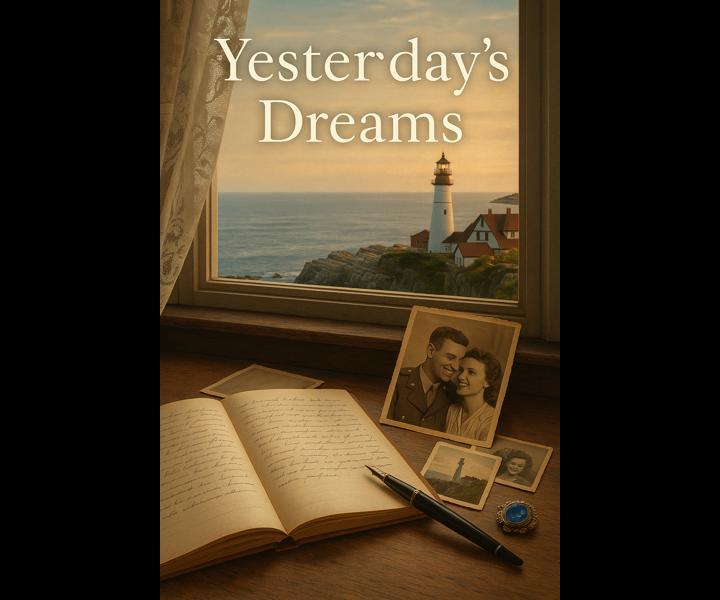
Author’s Note
With Yesterday’s Dreams, I hope to bring together stories of women who discover that the past is never as far away as it seems. Each story is self-contained, but they all share a common thread: the courage to confront what was hidden, the love that persists even in silence, and the strength to continue.
This book will take you through four such journeys —
The Forgotten Dress, where in the shadows of an attic, a trunk opens to secrets left behind.
By the Sea, set in Sicily, where a letter long buried carries the weight of sacrifice and hope.
An Untold Story, where a roll of forgotten photographs uncovers a love story never revealed. And finally,
The Lighthouse, on a rugged coast, where grief collides with change and an unexpected connection.
I hope you’ll find pieces of yourself in these women—their resilience, their questions, and the ways they reach for light in the midst of loss.
P.S. To encourage more readers, I have attempted to shorten the chapter lengths. Some may like that, and others might not. For those, I’ll try to keep the flow at a steady pace. But to all of you, thank you for following my posts. I appreciate it very much.
Have a great day and happy reading.
Always — Smiles to you from me.
Let’s Begin Again…
| Author Notes | To all of you who continue to follow and enjoy my endeavors, a great big hug and thank you. |
![]()
By Begin Again
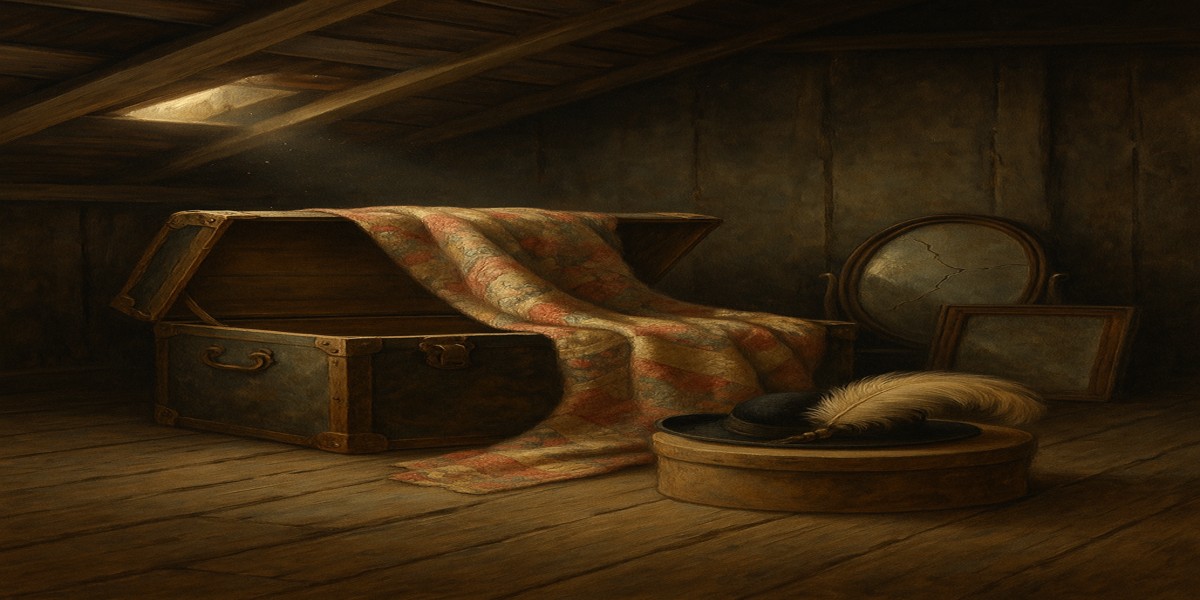
“Emily, I swear, if something crawls across my foot, I’m gone.”
Her cousin Marcy’s voice floated up the narrow ladder as Emily shoved open the attic hatch. Dust rained down in a thin shower, making them both cough.
“Oh, don’t be such a baby,” Emily said, swinging up into the dim space. “It’s just an attic.”
“Just an attic,” Marcy muttered, climbing after her. She wrinkled her nose the moment she stepped onto the creaking boards. “It smells like mothballs and dead spiders had a family reunion up here.”
Emily laughed, brushing cobwebs off a low rafter. “Come on, it’s not that bad. Look at this.” She lifted a faded hatbox and grinned. “Remember when Aunt June wore one of these ridiculous feathered hats to church?”
“My mother couldn’t stop sneezing. I think she was allergic to the feathers.”
“We couldn’t stop giggling.”
Marcy smirked despite herself. “Until she caught us and made us polish the silverware for punishment.”
They sifted through a stack of board games with missing pieces, giggling as they remembered the dares of childhood—how they’d sneak to the bottom of the ladder, only to be shooed away before they ever set foot inside. The attic had always been off-limits, a mystery suspended above their heads.
Marcy pointed her chin toward the far corner. “What’s that under the quilt?”
Emily glanced over. A cedar chest sat tucked against the wall, nearly swallowed by shadows. A memory stirred — her mother’s dismissive wave whenever she asked about the attic. There’s nothing up there but your grandparents’ old furniture and an old trunk of mine. Best leave it be.
Emily’s lips curved in a faint smile. “Maybe we should find out.”
Before they could, Marcy’s phone buzzed. She groaned at the screen. “Work. I have to take this.” She headed toward the ladder. “Don’t you go snooping in that spooky chest without me, okay?”
Emily rolled her eyes. “Promise.”
Moments later, Marcy called up, “Got to go to work, but I won’t be long.”
The attic grew quiet the moment Marcy disappeared. The quilt on the chest seemed to have slipped even farther, its corner pooling on the floor as if inviting her closer.
She whispered to herself, “One quick look. Marcy will never know.”
The words barely crossed her lips before Emily brushed the dust from the latch. “Just old furniture and a trunk, huh, Mother?” she whispered. “What secrets were you hiding?”
The latch snapped open. The lid groaned as she lifted it, releasing a breath of cedar and lavender.
Her eyes widened as she stared at its contents. A whisper slipped from her lips. “Oh, Mother.”
Inside lay a wedding dress, folded carefully, the satin yellowed but still luminous in the dusty light. Emily lifted it. The fabric was heavier than she expected, cool in her arms. She staggered toward the cracked mirror propped against the rafters.
The gown’s reflection glimmered back at her — long sleeves, lace collar, satin trailing like a forgotten dream.
Her pulse quickened. A wedding dress? But her mother never married.
She held it against herself, whispering, “Did you ever put this on, Mother? Did you ever imagine him waiting at the altar?”
She hurried back to the trunk in search of answers to her questions. A ring, maybe? Or old photographs?
Beneath a white shawl lay a bundle of envelopes. They shifted as she lifted the shawl from its resting place inside the trunk. Emily caught them, staring at the faded ribbon, the loops of her mother’s handwriting across the front. Beneath them lay another stack, the flaps still sealed, stamped in red: RETURN TO SENDER.
Her throat tightened. She set the dress aside and untied the ribbon.
The first letter crackled in her hand.
January 5, 1968
My Dearest Margaret,
Two weeks. That’s all the Army could spare me. Two weeks to hold you, to walk through the winter streets as though the whole world belonged to us. The goodbye at the station nearly broke me. I see your face every time I close my eyes. Two weeks were not nearly enough to hold a lifetime’s worth of promises.
When this war is done, nothing will keep me from you. I will come home, marry you, and build the life we dreamed of. Until then, you are my anchor, my reason to fight through the darkest hours.
Always yours,
Will
Emily traced the closing line with her fingertip, her breath trembling. “Mother — who is this man? He loved you.”
“Emily — you promised!”
She jumped. Marcy stood at the top of the ladder, eyes wide. “Oh, my gosh, is that a wedding dress? Whose is it?”
Emily swatted a stray tear and swallowed. “It was Mother’s.”
“But she never—”
“I know. I haven’t found a ring, but I’m sure she was spoken for. They had a plan. A future. This dress was waiting for it.”
Emily held up the letters. “Look. His name was Will. At first, the letters are filled with promises. A beautiful love story. But then—”
“What happened?”
Emily passed Marcy a page. “Here—read this one.”
Marcy read aloud, her voice unsteady:
I am thin, pale, a shadow of the man who left you at the train. I want you to remember me the way we were. Not broken, a mere shell of what I was.
Her eyes shimmered. “Oh, Emily, he did love her. And yet he was already pushing her away.”
Emily pressed her own letter to her chest. “He was in a hospital overseas. Even then, he was letting her go.”
They sifted deeper until they reached the heavier stack stamped RETURN TO SENDER. Emily broke one open.
Will, please don’t shut me out. I don’t care how long it takes, how hard the days are. I only want you. We can face anything together if only you’ll let me.
Another, her voice blotched with tears—
She is here. Our daughter was born last month, small and perfect, with your eyes. I named her Emily Rose, just as we once spoke of when we walked beneath the Christmas lights. I wanted you to know her name, to know she is real, even if you never hold her in your arms.
The letter slipped from Emily’s shaking hands. “My name,” she whispered. “She wrote my name.”
Marcy reached across the chest, tears sliding down her cheeks. “Oh, Em… it was always you.”
Emily drew the dress close, pressing her face into the satin. “You were so young, Mother. So full of love. And then you lost him. You carried me, carried all of this, and never told me. Why? Why couldn’t you share it with me?”
The attic beams groaned, the silence heavy with decades of secrets.
Later that afternoon, Emily sat across from Mrs. Carter, the letters spread on the neighbor’s table.
“I remember that winter,” Mrs. Carter said softly. “The year Will came home on leave. Your mother was radiant. I’ve never seen her so happy. But when he left again — something in her broke. She told him about you, and he turned away — well, it nearly broke her heart. She grew so sick we thought she might lose you. But when you came, Emily — when she held you — she swore you’d have the best life she could give you. Just the two of you.”
Emily’s tears burned hot. “Then why did she let me grow up believing I was nothing? Why did she hide it all?”
“Nothing? You’re wrong, Emily. You were everything to her. She thought she was protecting you,” Mrs. Carter whispered.
Emily rose, pacing. “Protecting me? She left me with silence — without a father. And him—” Emily choked. “My father — he abandoned us both. He owes me answers.”
Back at the house, Emily broke. She dropped the letters onto the couch and cried out into the emptiness.
“Why, Mother? Why did you carry this alone? Why couldn’t you tell me I was loved?” Her voice cracked, rising to a scream. “And you, Will! Where were you? Why did you push her away? Why did you push me away?”
Her sobs echoed through the rooms until she crumpled, clutching the letters to her chest. Finally, she snatched up her phone and dialed.
“Em?” Marcy’s voice was immediate, worried.
“Marcy—I can’t—” Emily’s sobs broke into gasps. “Why didn’t she tell me? Why did he leave us? Why wasn’t I enough?”
On the other end, Marcy’s voice was soft, steady. “You are enough. You always were. But maybe — maybe it’s time to find out the truth. About him.”
Emily’s grip tightened on the phone. “I don’t know if I can face it.”
“Then let me face it with you.”
That night, sleep would not come. When she closed her eyes, Emily saw her mother — radiant in satin and lace, smiling with a hope that had long since vanished.
She rose in the dark, climbed the attic ladder, and opened the cedar chest.
Moonlight spilled across the floor as she drew the dress into her arms and sank to the boards, the satin pooling around her like liquid silver.
“Why did you bear this alone?” she whispered into the lace. “Why couldn’t you let me in?”
Her sobs shook the rafters, the dress trembling in her embrace. And in that moment, beneath the weight of her mother’s silence, Emily vowed she would uncover the truth — no matter where it led.
![]()
By Begin Again
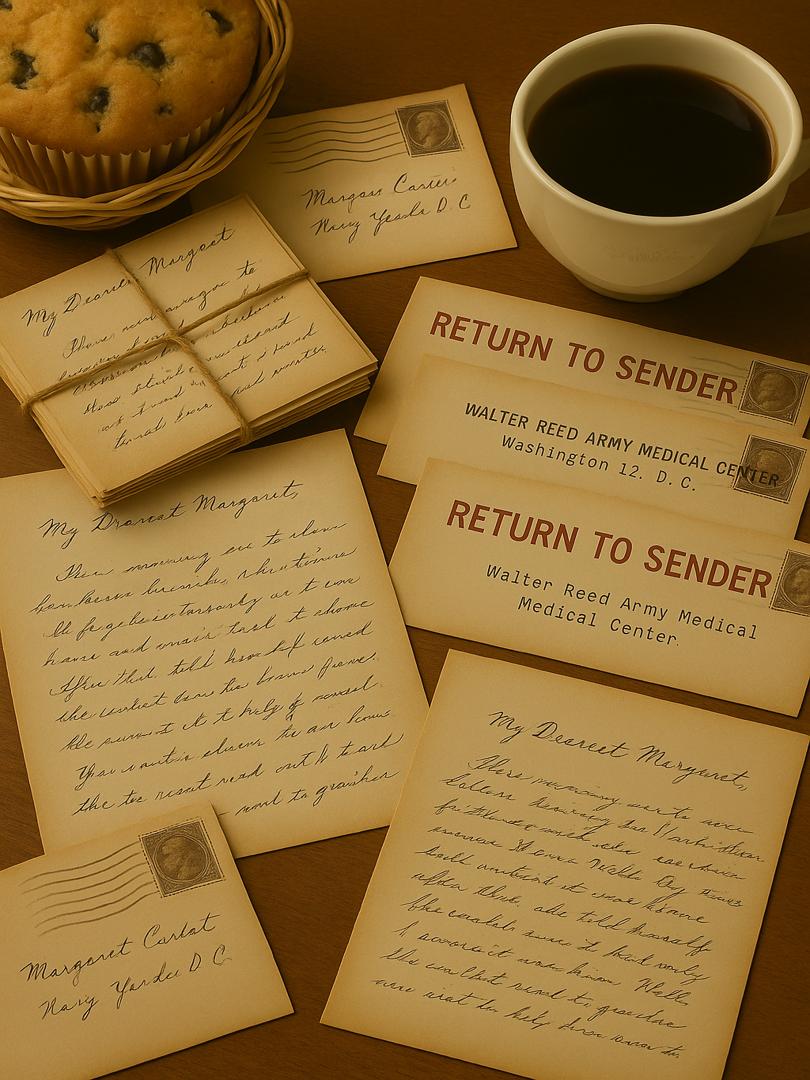
The morning light slipped through the attic window, pale and cold. Emily hadn’t realized she’d fallen asleep curled against the cedar chest, the wedding dress still draped across her lap. Her neck ached, her eyes were swollen, but the ache in her chest was sharper than either.
She folded the gown carefully back into the trunk and carried the bundle of letters downstairs. Coffee hissed in the pot as she spread them across the kitchen table, arranging them not by ribbon but by postmark.
Vietnam. Stateside hospitals. Military post offices. The handwriting grew shakier as the months wore on, his hope dwindling with each letter. She forced herself to trace every detail — each return address, each faded stamp.
Her gaze lingered on one in particular, the envelope marked 106th Army Hospital — Cam Ranh Bay, Vietnam. Another bore the heading Walter Reed Army Medical Center, Washington, D.C.
She grabbed her phone, her thumb hovering over Marcy’s name before she pressed dial.
Marcy answered groggily. “It’s not even seven, Em…”
“I think I found something,” Emily blurted. “The letters — they list the hospitals. That’s where he was. If he came home, if he survived, there’ll be records.”
Marcy was silent a beat before she said, more awake now, “Then that’s a good place to start.”
Emily’s hand tightened around the phone, her pulse hammering. “I don’t know if I want to find a gravestone or a man. But either way, if he’s my father — well, I have to know.”
Marcy yawned audibly. “Fine. But let me go back to sleep for just an hour, okay? Unlike you, I don’t thrive on three hours and coffee fumes.”
Emily managed a smile. “Sleep your life away then. I’ll call later.”
When the line went dead, the kitchen felt empty, leaving Emily sad and alone. Her thoughts quickly turned to her mother, and she whispered, “Oh, Mom, I wish you were here. I sure could use one of your hugs.”
The smell of coffee filled the room, bitter and rich, as Emily spread the letters more neatly across the table, the postmarks forming a timeline of hope, despair, and silence. She was still tracing the faded ink when a knock came at the back door.
Emily hesitated, not yet ready to face the daily grind of living. When the knock came again, she opened it to find Mrs. Carter holding a basket covered with a linen cloth.
“I brought muffins,” the woman said quietly. “Blueberry. Your mother’s favorite.”
Emily stepped aside. Mrs. Carter placed the basket on the counter, smoothing the cloth with trembling hands. For a moment, neither spoke. Finally, Mrs. Carter turned, her eyes soft.
“I owe you an apology, Emily. Yesterday I wasn’t fair. I’ve carried your mother’s request for so long — not to speak of what she’d endured — that I couldn’t seem to let it go, even with her gone.”
Emily swallowed, her throat thick. “So, you did know.”
Mrs. Carter nodded slowly. “Not everything. But I knew she loved him. I knew losing him nearly destroyed her. And—” She hesitated, folding her hands tightly. “There’s something else. Something your mother once admitted, and something I later saw with my own eyes.”
Emily’s heart jolted. “What do you mean?”
“Your mother once thought she saw him in Fairhaven. We were out shopping, and she froze mid-step, certain it was Will. By the time she turned back, the man was gone. After that, she told herself it had only been a trick of the heart. She couldn’t bear to believe otherwise.”
Mrs. Carter’s voice softened. “But months later, I passed through Fairhaven on my own. I caught sight of a man outside a woodworking shop, sitting at a table, smoothing a piece of wood. For a moment, I swore it was him. The way he bent his head, the set of his shoulders — it was Will. I wanted to go closer, but something held me back. If he hadn’t gone to your mother by then, maybe he never would. And I couldn’t bring myself to raise her hopes only to see them crushed again.”
Emily stared at her, the letters trembling beneath her fingers. “So, he might have lived.”
Mrs. Carter reached out, laying her hand gently on Emily’s arm. “He might have. And if he did — I think Margaret wanted to find him, but couldn’t bring herself to shatter the life she had built for the two of you.”
Emily closed her eyes, the weight pressing deep. The words slipped from her lips, “He might have made it home then. But why not to us?”
Mrs. Carter’s hand lingered on Emily’s arm, then let it slip away. A few minutes later, Emily heard the back door click shut, leaving only the tick of the kitchen clock and the faint hiss of the coffeepot.
The letters still lay in neat rows across the table, their postmarks blurring through her tears. She brushed her sleeve across her eyes and forced herself to look closer. One envelope, tucked near the bottom of the stack, carried a date that made her heart stumble — March 2, 1969.
Her fingers trembled as she pulled it free and unfolded the fragile page.
March 2, 1969
My Dearest Margaret,
They’re moving me stateside soon, closer to home. It frightens me, how much I long for and dread that word all at once — home. You remember Fairhaven, don’t you? My father still keeps the woodworking shop on Main Street — “Bennett & Son.” He says the name feels foolish now, with no son to help him run it, but he keeps it painted above the door anyway.
I told him once that when the war was over, you and I would walk through that door together, hand in hand. It was a silly dream, maybe, but one I clung to when the nights grew long. Now, I know it will never be mine. Still, I hold it, clinging to what was supposed to be our future. Life changes things, and I’m sorry.
Always,
Will
Emily’s hand shook as she lowered the page. She grabbed her phone again and called Marcy back before she could talk herself out of it.
Marcy answered on the second ring, her voice muffled with sleep. “Em, I swear—”
Emily cut her off, her words tumbling out. “He names it, Marcy. Bennett & Son. A woodworking shop on Main Street. It’s right here in the letter.”
Silence stretched a beat, then Marcy’s tone sharpened, fully awake now. “That’s perfect. A family business in a small town? Someone will remember it, even if it’s long gone.”
Emily pressed her hand to the paper, her chest tightening. “He wanted her to walk through that door with him. And she never got to.”
Marcy’s voice softened, all traces of grogginess gone. “Maybe you can, Em. Maybe it’s not too late to at least walk through that door yourself.”
Emily let the words settle deep. Was he there, or was it just her wishful thinking?
| Author Notes | As promised...only 1175 word count. |
![]()
By Begin Again

![]()
By Begin Again
.png)
![]()
By Begin Again
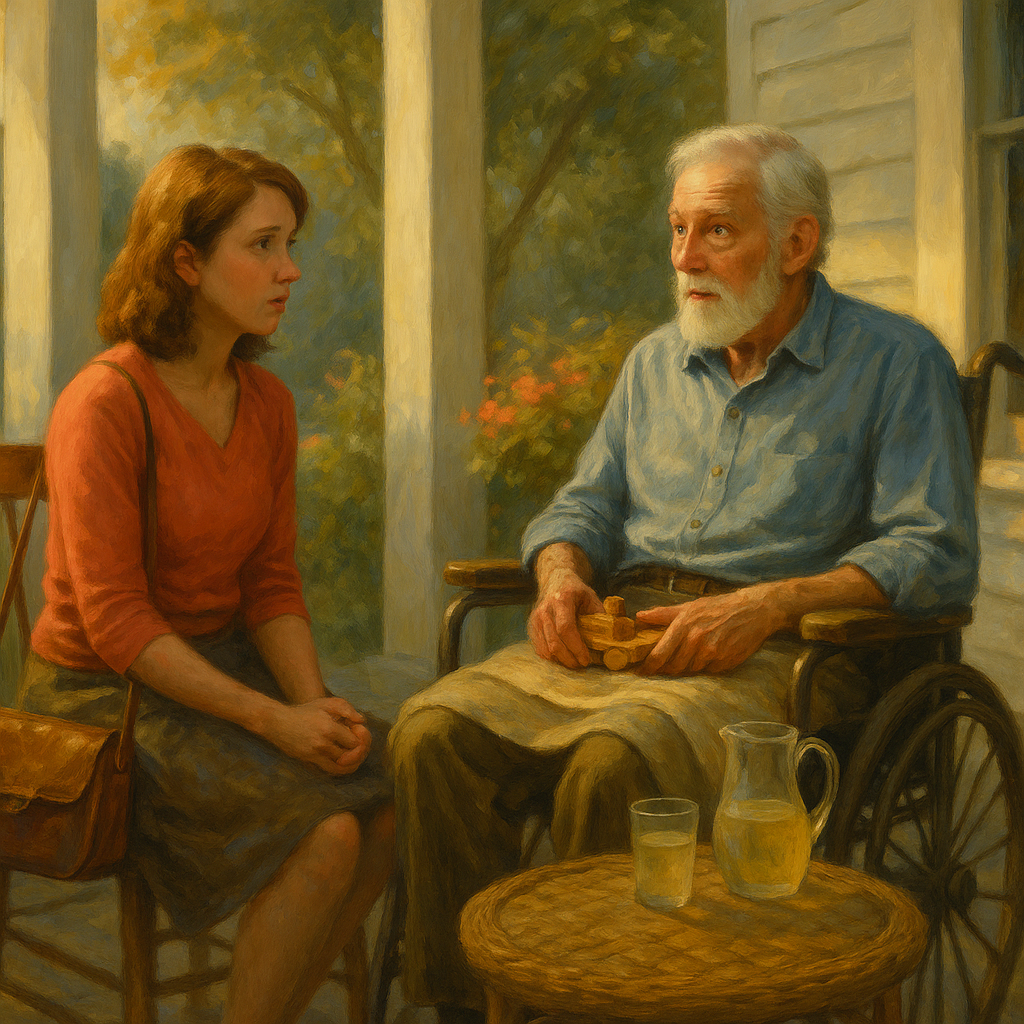
![]()
By Begin Again
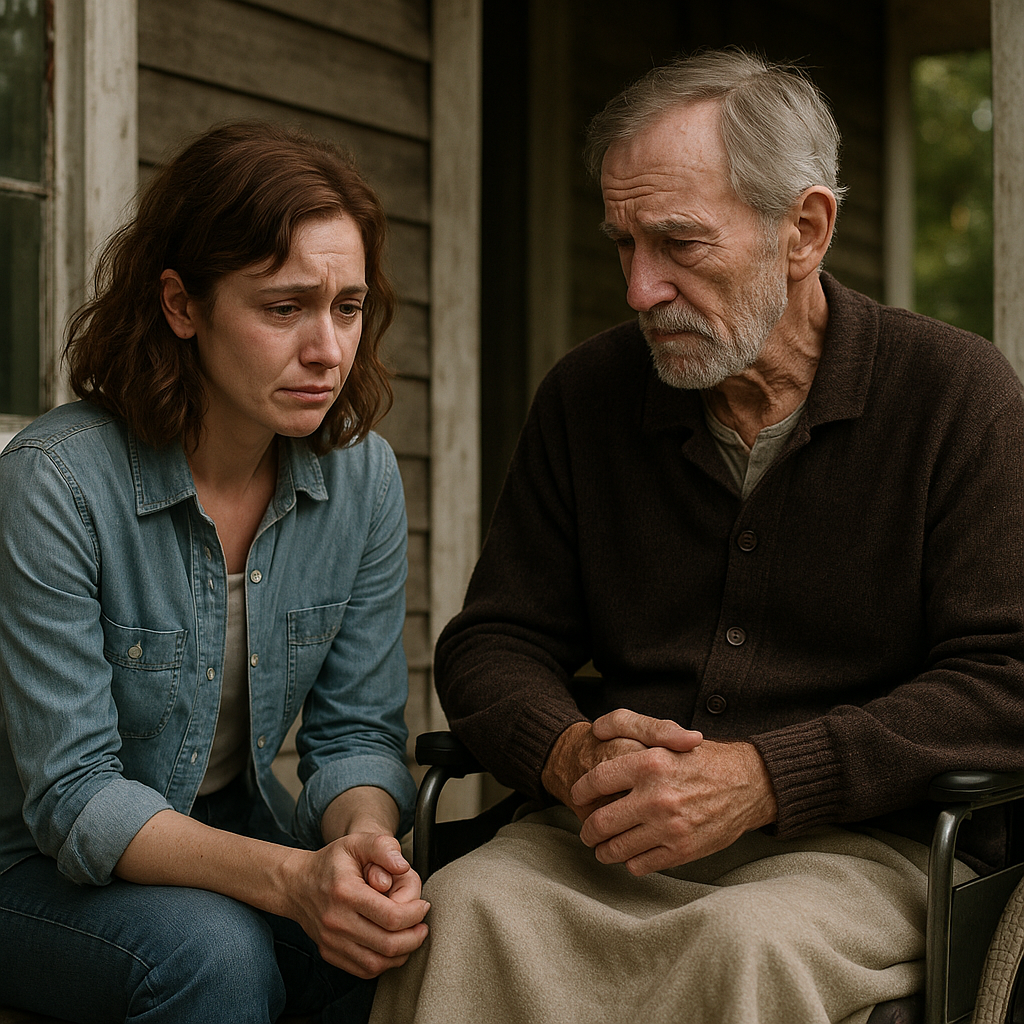
Will stared at the bundle as though it were something alive, something dangerous. His chest rose and fell unsteadily.
Emily swallowed hard, her voice breaking. “I’m Emily. Margaret’s daughter.”
The silence that followed was thick, shattering.
Will’s eyes lifted slowly to her face. He looked at her long and searching, his expression shifting through disbelief, recognition, and something so raw it nearly undid her.
“Margaret’s — daughter.” His voice was scarcely more than a whisper.
Emily’s tears blurred the edges of him, but she held his gaze. “Your daughter.”
![]()
By Begin Again
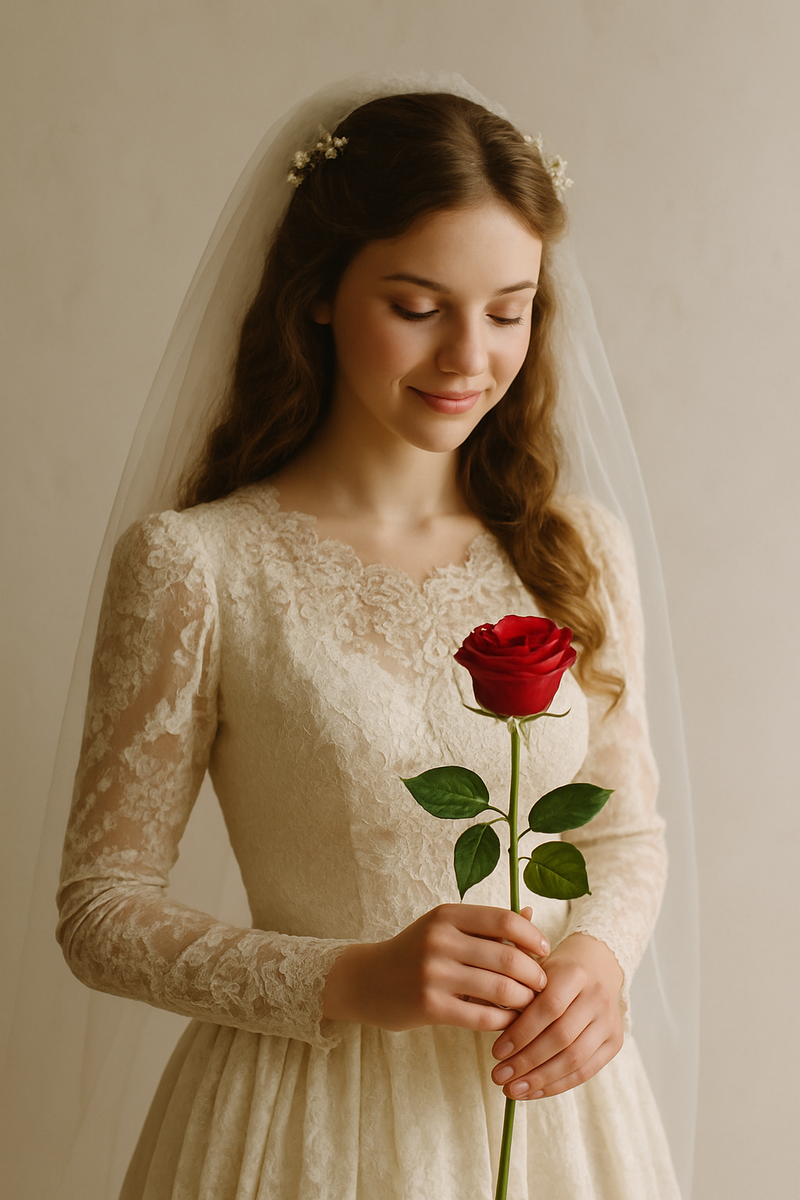
| Author Notes | Thank you for walking this journey with me through The Forgotten Dress. Your encouragement has meant so much along the way. I hope you'll continue with me into the next story, By The Sea, where new secrets, love, and discoveries wait just beyond the shoreline. |
![]()
By Begin Again
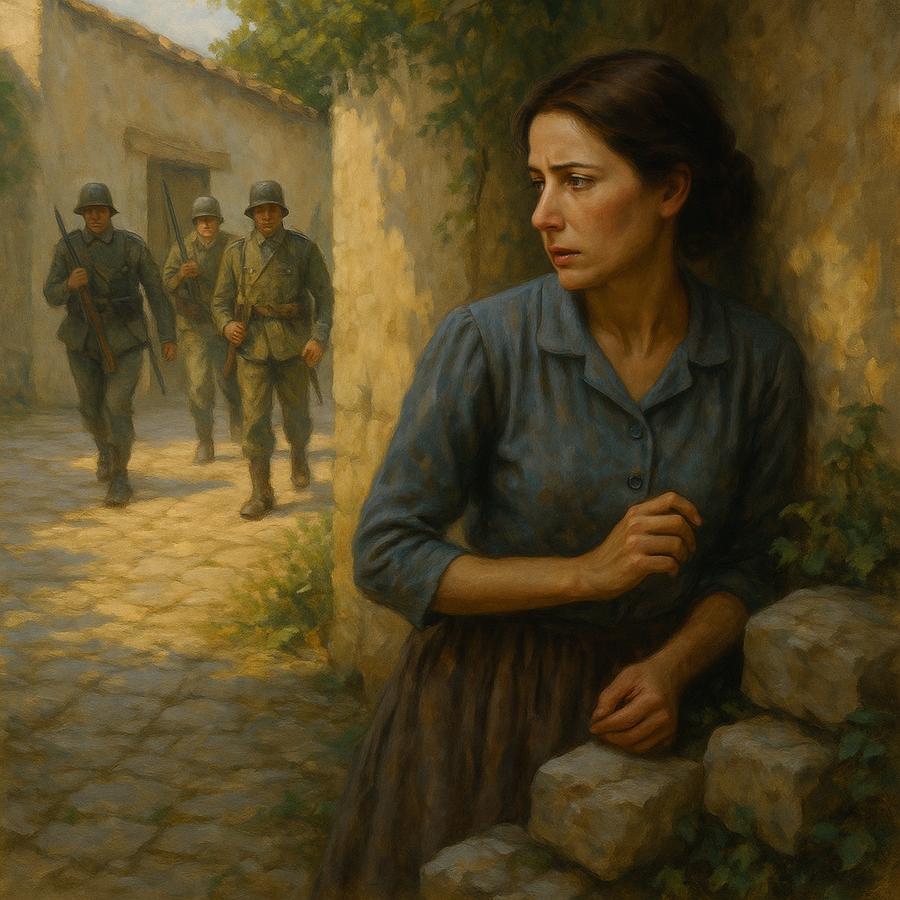
| Author Notes | By The Sea is the second in a series of four in the book Yesterday's Dreams. Thank you for continuing to follow and enjoy the stories. |
![]()
By Begin Again
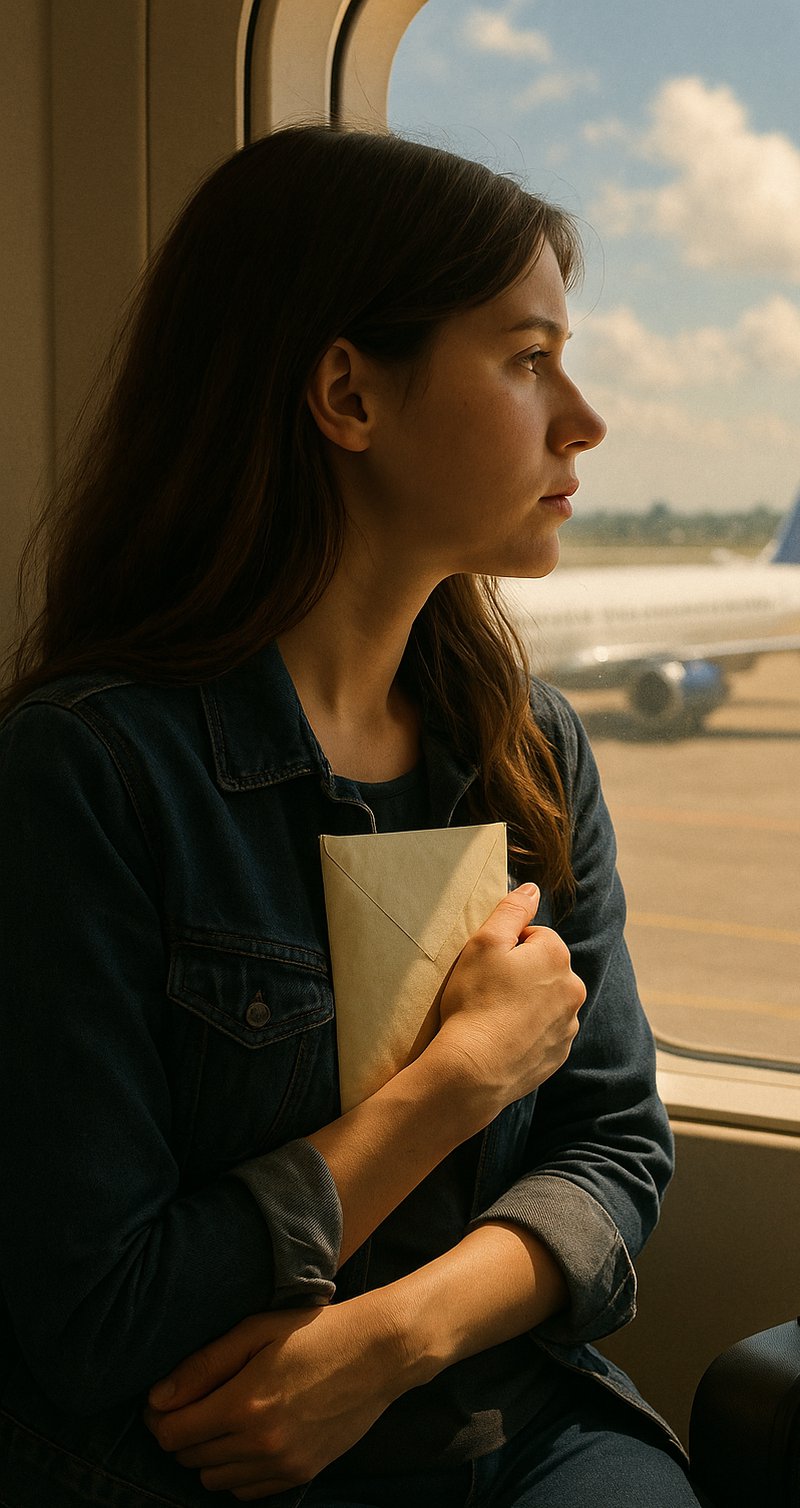
![]()
By Begin Again

The captain’s voice broke through Anna’s thoughts. “Ladies and gentlemen, we’ll begin our descent into Palermo shortly. Please fasten your seat belts.”
Anna straightened, tugging the strap of her purse across her shoulder, and pressed her forehead to the window. The clouds parted, and her breath caught.
Below stretched an ocean of blue, flecked with sunlight. The water lapped against rugged cliffs softened by olive groves. Villages with terracotta roofs spilled down the hillsides, narrow streets threading between them.
Foreign yet somehow familiar. A slight ache rose in her chest as if her blood recognized what her eyes had never seen.
The plane tilted, circling lower. Anna brushed the edge of the letter. It seemed impossible that a single sheet of paper had brought her this far, yet it was the only proof she had — Sophia had lived, loved, and left behind more than silence. Somewhere, a child had survived, at least she hoped — a child connected to her life as well.
When the wheels struck the runway, applause rippled through the cabin. Anna blinked hard and inhaled sharply. Whatever she had come in search of was about to begin.
*****
The airport was a blur of voices and announcements. An overhead screen scrolled arrivals in flickering green letters. Tourists clutched maps and paper brochures. Anna joined the customs line, passport, and the blue-and-white immigration card she’d filled out mid-flight in hand.
At the desk, the officer flipped through her passport. “Tourist?”
“Yes.” A bit sharp but not intended. She swallowed and smiled. “Yes.”
The stamp thudded down. He waved her through.
Beyond customs, the baggage hall was filled with carts and shouts coming from every direction. Suitcases thumped onto the carousel. Anna waited until her scuffed navy case rolled past, the faded green ribbon tied to the handle catching her eye — Elizabeth’s ribbon, left there on purpose. She pulled the case free and headed for the exit.
*****
Outside, the heat pressed close, edged with exhaust and the faint tang of the sea. Taxi drivers held up paper signs, names scrawled thick in marker.
“Dove va?” a driver asked, then switched easily to English. “Where are you going?”
Anna handed him the slip with the address on it. La Casa sul Mare.
“Ah, sì.” He loaded her suitcase into the trunk. Laura Pausini’s voice rose thinly from the radio as he pulled into traffic. “That place has stories. Old ones.”
“What kind of stories?” Anna asked.
He shrugged, one hand loose on the wheel. “In Sicily, every stone has a story. Some good, some bad. That house —” He tapped the steering wheel, smile fading. “It remembers.”
Anna sat back and watched the city slip into the countryside — lemon trees bright against dark soil, vineyards in neat rows, the sea flashing between cliffs. Children kicked a battered soccer ball down a lane. Women shook out sheets from balconies. Voices carried, and life moved.
They passed a crumbling stone arch. “Monastery,” the driver said. “Germans used it in the war. People say the walls still remember their presence. Some say they still hear the sound of their boots."
The letter and thoughts of the past filled Anna's thoughts. She didn’t know where to start, but maybe the island would show her.
*****
The cab turned onto a narrow lane shaded by bougainvillea. Its crimson blooms spilling over the stone. At the end of the road, the sea opened wide, its waves beating steadily against the rocks. A pale stucco house with green shutters stood close to the cliff. A weathered sign swung above the door: La Casa sul Mare.
Before Anna could knock, the door swung wide. A woman stepped out, gray hair pinned neatly, dark eyes bright with welcome. Without hesitation, she opened her arms and drew Anna into a full embrace, kissing the air near each cheek. She smelled faintly of lavender water and baked bread.
“You must be Anna,” she said warmly, her accent lilting. “I am Rosa. Welcome, my dear. Welcome to La Casa sul Mare.”
The sudden affection startled Anna, then steadied her. The hug was so like her grandmother’s — solid, certain — that for a moment she felt Elizabeth by her side.
“Come in, come in,” Rosa urged, guiding her across the threshold.
Cool tile met Anna’s soles in the foyer. Coffee and salt air drifted through open windows. Somewhere a door clicked, a pot simmered, a chair scraped — house sounds, lived-in and comfortable.
“Your room,” Rosa said, taking the suitcase handle so they could guide it together up the stairs. “Rest a little. Dinner at seven in the courtyard. We eat as a family.”
Upstairs, Rosa opened a simple room with shuttered windows. “If you need anything, call down,” she said, squeezing Anna’s hand. “I fuss. That is my nature.”
When Rosa left, Anna crossed to the window and unlatched the doors. A small balcony stood just wide enough for two feet and a breath of air. She stepped out.
Below, the courtyard spread in squares of shade and sun. Beyond it, a narrow strip of garden ran along the wall—herbs in low beds, tomatoes staked, a fig tree casting broken light. A man stood near the rosemary, turning the soil with a hand fork. Sleeves pushed to his elbows, forearms strong, he paused to wipe his brow with the back of his wrist.
Anna couldn’t see his face at first. He set the tool down and straightened, testing his lower back with both hands. When he glanced up toward the house, sunlight caught his features. He was younger than she expected—thirty, maybe—and there was a quietness in the way he looked at things, like he was used to making do with what was in front of him.
For a second, she thought his eyes had found her. Heat rose in her cheeks. She drew back a half step, not hiding, just uncertain. He bent again to his work, none the wiser, and the small ordinary rhythm of it—turn, shake, pat—calmed her more than sleep would have.
Anna closed the shutters to a sliver and exhaled. The letter in her purse rustled when she set the bag on the chair. She washed her face, changed her blouse, and stood a moment at the mirror until the stranger in it began to look like herself again.
*****
By the time she came down, the courtyard had come alive. Lanterns hung from wires, throwing soft light across a long table set beneath the vines. The air carried the scent of garlic, roasted tomatoes, and warm bread. Voices overlapped — Italian and English, easy and bright.
Rosa clapped her hands. “Here she is — our newest guest.”
A dozen faces turned toward Anna, smiling with curiosity. She slid into an empty seat. A plate of antipasti appeared — olives, prosciutto, and wedges of cheese.
“Wine?”
Anna looked up. The man from the garden stood beside her with a bottle. Up close, his features were more striking than they’d seemed from above — his eyes were a deep brown and his smile was warm.
“Yes, thank you,” she said, offering her glass.
He poured carefully. “I’m Luca,” he said. “My mother runs the inn. And you are —?”
“Anna.”
His smile tilted, hesitant but inviting. “Welcome, Anna.”
“Luca, you forgot me,” a lilting voice chimed.
A young woman leaned across the table, dark hair glossy, lips a bold red. She tapped her glass with a manicured nail, her look sliding over Anna before returning to him.
Luca filled her glass without comment.
“I’m Isabella,” the woman said to Anna, light and smooth. “The neighbor. You’ll see me often.”
Anna offered a polite smile. Isabella’s hand rested on Luca’s sleeve a beat longer than necessary.
Dishes moved down the table — pasta bright with tomato and basil, baskets of bread, roasted chicken with rosemary. Laughter rose and fell. Anna ate, listened, and let the noise of other people’s lives steady her. Every so often, she felt Luca’s glance touch her like a quick check-in — are you all right? — and found herself answering with a slight nod, which she hoped read as yes.
Later, glasses lifted in a shared toast. Anna looked toward the dark line of the sea beyond the wall. Did you sit like this, too, Sophia? Did you and my grandmother laugh over a table like this before everything changed? The thought landed and stayed.
Rosa reached to refill Anna’s glass and squeezed her shoulder. “Tomorrow,” she said, “you walk to the market. And after that, you must visit the Church of Santa Lucia. There is a small garden behind it. People go there to think and pray.”
Anna nodded. “That sounds good.”
As the guests drifted to their rooms, Luca gathered plates. Isabella lingered, saying something low that made him smile out of courtesy more than amusement. When he turned, he found Anna watching, and he lifted the stack of dishes a little, as if to say, 'Work first, everything else after.' She smiled back. It felt easy.
In her room, Anna set her purse on the chair and opened the shutters an inch. The courtyard lights clicked off one by one. Only the sea kept moving. She sat on the bed and slid the letter from her bag, not to read it — she knew the line that mattered — but to feel its edges and tell herself that tomorrow she would start.
She folded it again and lay back. The house settled. Somewhere below, a door latched. She closed her eyes and pictured the garden — the small square of earth, the fig, the man turning the soil — and let that simple picture carry her to sleep.
![]()
By Begin Again
.png)
Anna woke to sunlight spilling through the shutters. For a moment, she forgot where she was, but the sound of waves returned her to Sicily.
Downstairs, the courtyard carried the delicious aroma of coffee. Rosa bustled around her kitchen, her earrings swinging as she moved to the music in her head. When she saw Anna, her face lit up and she pulled her into another hug, kissing both cheeks.
"Buon Giorno! Mi Bella! Sit, sit. You must eat."
A plate appeared with bread, cheese, honey, and a steaming cup of strong coffee. Rosa poured her own and sat across from her, watching with a kind of motherly scrutiny. Not known for restraint, she tilted her head and asked, "For someone so beautiful, I would not expect you to travel alone. Or do you come with a broken heart?"
Anna hesitated, then shook her head. "Not broken. Just not fulfilled."
"Ah." Rosa reached across the table and patted her hand. "Not broken is good. Not fulfilled can change." Her smile deepened, soft but certain. "Sicily greets those who walk with their own feet. Maybe here, you will find that fulfillment in time. But today—" She spread her hands wide—"you should start with the market. It will welcome you. The air there smells of oranges and bread warm from the oven. Vendors call out your name after the first visit, and old women slip you figs as if you were their grandchild. Children run between the stalls, chasing a stray ball, and the voices rise like a song, all mixed together. It is where you taste the heart of this place. Go, and you will feel it."
Anna smiled faintly. "The market, then."
"Good. Always alive on Friday." Rosa's eyes softened, as if she could see it in her mind. "And afterward, the church of Santa Lucia, which is very old. The stones are worn smooth where generations have knelt." She made the sign of the cross, her gaze dropping for a breath as though touched by an old sorrow.
"But behind it," she went on, her smile returning, "is a quiet garden, shaded, with benches beneath the olive trees. The sisters tend it still, their habits bright in the sun as they care for herbs and flowers. People go there to pray. Or to think if prayer is not yet ready. At the center is the Fountain of Grace. Once its waters were drawn for holy rites, but in time it became something more—a place where villagers sit to let go of sorrow. The trickle of water and the doves overhead remind us that life can be gentle again."
Her voice lowered. "During the war, soldiers took the cloister for themselves. Their boots silenced the prayers, and one wall lies broken still." She paused, then lifted her chin with quiet conviction. "But the garden has never stopped growing. The fountain runs clear, and those who come leave lighter than when they arrived. It is a place that calms the heart."
Before Anna could answer, the scrape of the door made them both look up. Luca crossed the threshold, sleeves pushed to his elbows, hair damp from washing. He smelled faintly of rosemary from the garden.
"Buon Giorno!"
"Good morning," Anna said exuberantly and then quickly lowered her eyes to stare into her coffee.
"Mama says you might want to go to the market?" he asked. "I can show you the way."
Rosa waved a hand and patted Luca's cheek. "Yes, of course, Luca will take you. He's a good boy." Turning to face her son, she waved a finger. "You tell Marco the fennel last week was tired."
Luca rolled his eyes. "Mama, you already told him that."
"Then tell him again." Rosa touched Anna's shoulder. "Go. Sicily awaits you. You must drink in all that it has to offer."
*****
At a shrine to the Madonna, he slowed, touching his fingers briefly to the stone ledge before crossing himself with casual reverence—not showy, but instinctive, as natural as breathing. Anna glanced at him, the simple gesture stirring something she couldn't quite name. David would never have paused, never thought to mark the moment. Luca carried his heritage with an ease that set him apart.
"My mother said you came alone. It is brave."
"It felt more like necessary," Anna said, tucking a strand of hair behind her ear. "Sometimes those are the same."
He nodded. "And sometimes necessary is harder." He gestured ahead. "There the market greets us."
The piazza opened bright and noisy. Stalls crowded under canvas awnings—pyramids of lemons, crates of tomatoes, baskets of capers, wheels of cheese perfuming the air. Vendors shouted prices with theatrical conviction. An old man fried chickpea fritters, sliding them into paper with a flourish of salt.
Luca moved easily among them, returning greetings, slipping Anna a piece of melon from a vendor's knife.
"It tastes like July," she said, surprised.
"Even in October," he agreed, pleased.
They paused at a table of odds and ends—keys, saucers, paperbacks. Among them sat a small carving of a bird, wings slightly lifted as if ready for flight.
Anna reached for it, then froze. The simple lines, the gentleness of its beak—it echoed something described in Sophia's letter.
"Take it," the stall keeper urged. "It is nothing. A child made it, or a father with clumsy hands."
Anna hesitated. "How much?"
He waved a dismissive hand, eyes twinkling. "For the beautiful American with the pretty smile? Nothing. A gift. Sicily must welcome you."
Her cheeks warmed as she murmured, "Thank you." She slipped the bird into her bag, unsettled by how reluctant she felt to set it back. The wood was warm from the sun, light as breath in her palm.
Luca didn't press. With a grin, he handed her a paper cone of warm sugared almonds. "And not to be outdone by Giuseppe with his generosity, I bring something sweet for that gorgeous smile."
Anna laughed, surprised, the almonds warm against her palm. It was nothing—just a passing kindness, a casual flirtation, but she felt the warmth of it all the same. David never tossed words like that, not even lightly.
They ate as they walked, sugar dusting their fingers. Anna told him a story about the winter her grandmother tried to thaw a frozen chicken with a hair dryer, scolding it like a child until it finally softened.
Luca chuckled, the sound low and warm. "Elizabeth," he repeated, testing the name. "It suits someone who would argue with a chicken until she won."
Anna smiled. "She always did. She lived here when she was young."
His expression shifted, gentler now. "When I carried your bag upstairs, I saw the green ribbon tied to the handle. Old, frayed, but still strong. It seemed like something done by a woman named Elizabeth."
Anna blinked, surprised at how closely he had noticed.
Before she could reply, a familiar voice cut in. "Luca!"
Isabella wove through the crowd with a wicker basket looped over her arm, a red scarf bright at her throat. Her smile found Luca first, then cooled as her gaze shifted to Anna.
"So, the American guest enjoys our market," she said smoothly, turning to face Luca. "I wondered if I might see you here."
"I am always here on Fridays," Luca answered easily.
"Your mother sends you to argue with everyone," Isabella teased, then let her eyes linger on Anna's sugared fingers. "And already you share our almonds. Quick to make yourself at home."
"Anna is a guest at the house," Luca said simply.
"I know," Isabella replied, her tone light but edged. "Guests come and go. The sea keeps none of them." She turned back to Luca, brightening. "My aunt has basil. Come by later. I've purchased a special wine—perhaps we might share a glass." Her fingers lingered briefly on his sleeve, her smile meant more for him than for Anna. Then she swept off, leaving the hint of her claim hanging in the air.
Luca exhaled, half amused. "Isabella knows everyone. She likes to make sure everyone knows she knows."
Anna lifted a brow, the corner of her mouth curving. "And she makes certain no one forgets it."
Luca chuckled, the sound low and warm. "You see quickly." His eyes lingered on her a moment longer than necessary before he turned back toward the stalls.
Inside, the air was cool and hushed. Candles flickered at side altars, their wax scent mingling with incense. Anna slid into a pew, letting her breath slow in the silence. She touched the letter in her purse, her thoughts gently drifting to her grandmother and Sophia.
The stillness pressed close, filled with traces of footsteps and whispered prayers. She watched a woman bow before a statue of the Madonna, leaving a sprig of rosemary at the base. Anna wondered what it meant to bring both faith and sorrow into the same place. Had Sophia prayed for her child at this altar, or had her grandmother sought guidance?
Her fingers tightened on the purse strap. She thought of her grandmother's laughter and her stubbornness, even in the face of illness. If Elizabeth had stood here, would she have prayed? Or argued with heaven as fiercely as she had with a frozen chicken? The thought brought a small, shaky smile.
At last, Anna rose. Drawn by light spilling through an archway, she followed it until the door opened onto the garden behind the church.
Sunlight dappled the orange trees. The Fountain of Grace trickled softly at the center, its water catching the light. A nun sat nearby, rosary looped through her fingers. Her face was lined, her posture upright, her eyes fixed on something unseen.
At the scrape of the gate, she looked up. Her gaze met Anna's—dark, intent, almost startled. For a heartbeat, it seemed as if she had been caught in some private act, though she was doing nothing but sitting with her beads. Without a word, she rose abruptly, her steps quick as she left the path.
Anna frowned. Strange behavior for a nun. Weren’t they supposed to be calm, welcoming?
Another sister passed by, pausing when she saw Anna's expression. She offered a small, apologetic smile and said in careful English, "She is—sensitive. Troppi ricordi—too many memories." The nun shook her head gently, then made the sign of the cross. "May God be with you."
Anna moved to the fountain and rested on its stone edge, still unsettled. The trickle of water and the rustle of doves overhead did little to quiet her pulse.
Luca appeared in the archway, sunlight at his back. "There you are. I thought the garden might have claimed you."
Anna’s gaze flicked once more toward the path where the nun had vanished. "For a moment—maybe it did." Her voice was quiet, thoughtful.
He studied her, then extended his hand. She hesitated, then took it. His palm was warm, his grip sure.
They walked back toward the sea, but Anna's thoughts stayed in the walled garden. The nun's eyes had held hers for only a moment, yet something about them lingered—strange, unsettling, and not easily forgotten.
| Author Notes | Sorry..this chapter spilled passed the planned 1500 but I hope you enjoyed the extra descriptions... Thank you. |
![]()
By Begin Again
.png)
![]()
By Begin Again
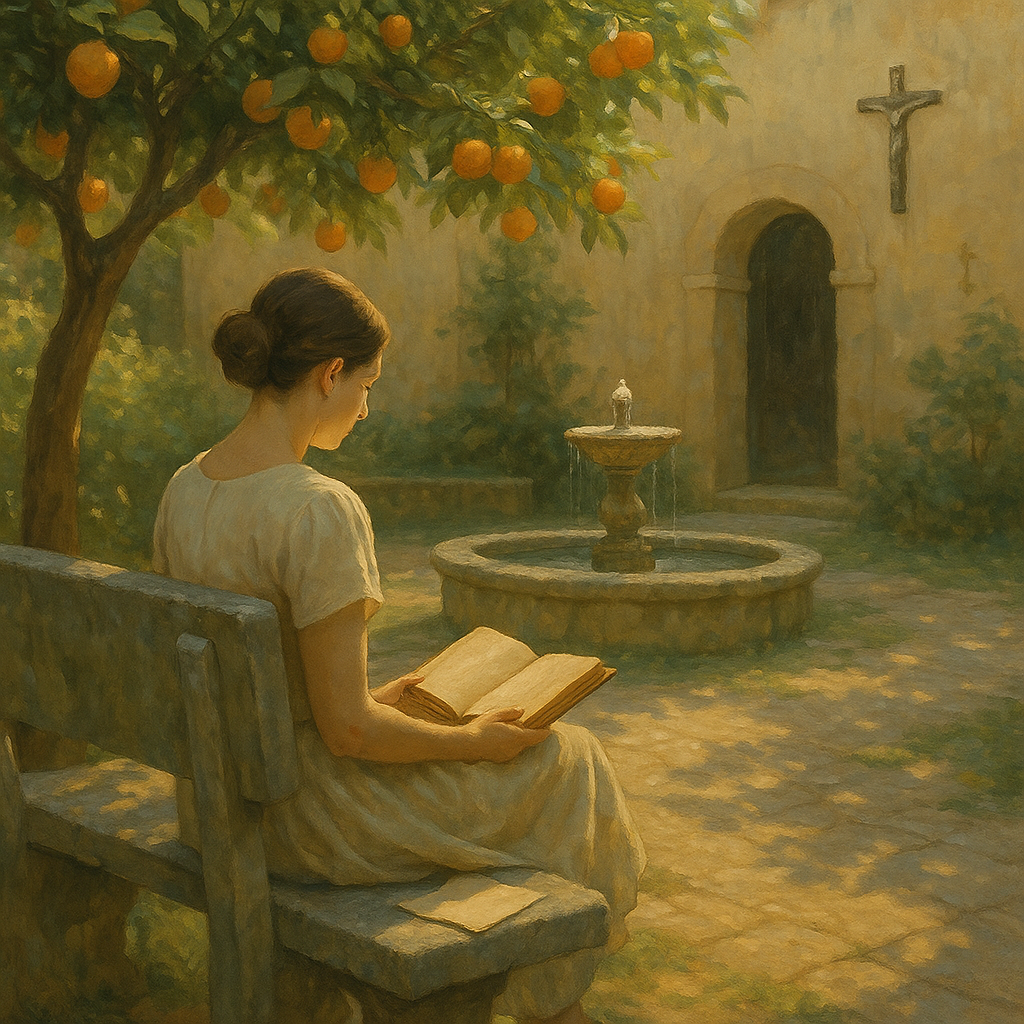
![]()
By Begin Again
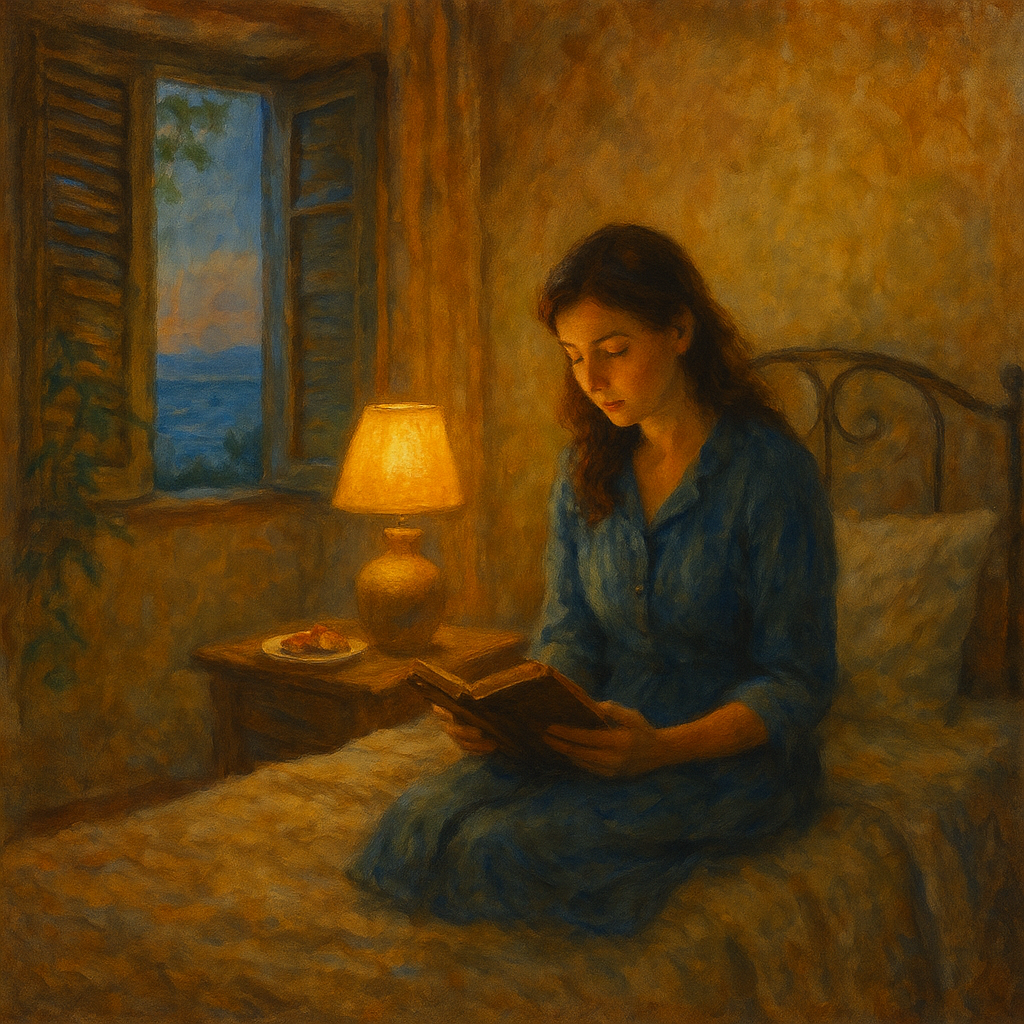
![]()
By Begin Again
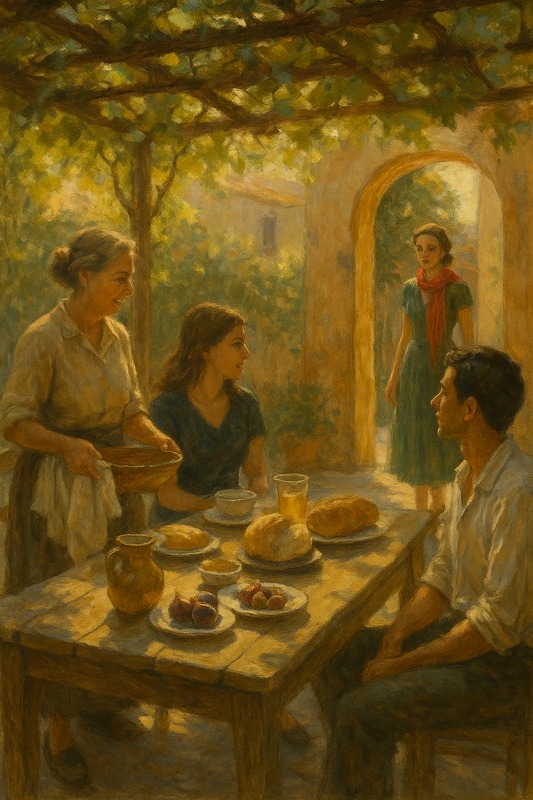
![]()
By Begin Again
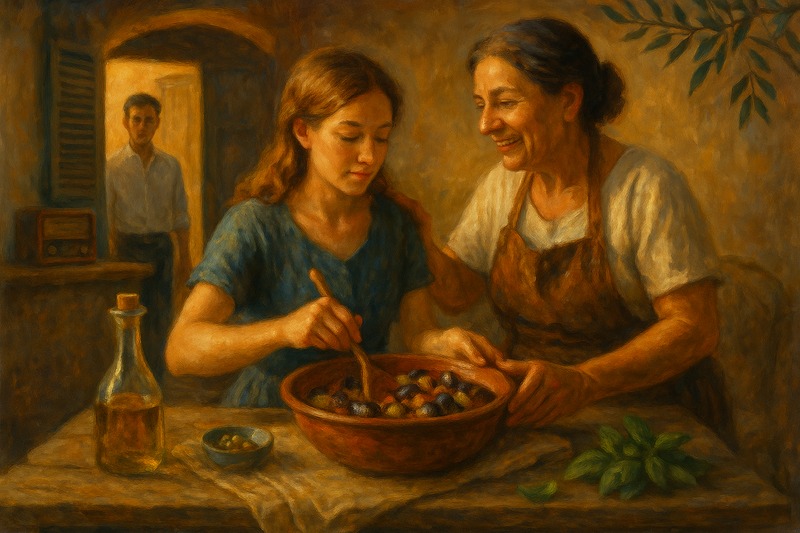
![]()
By Begin Again
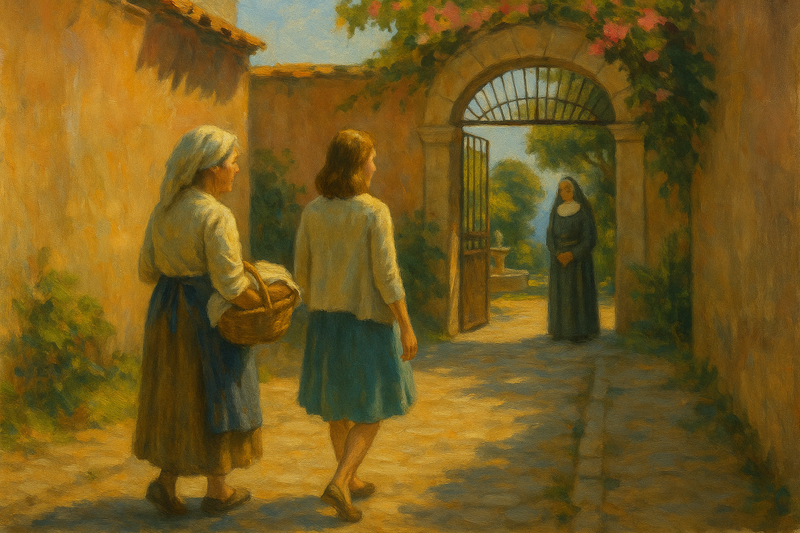
![]()
By Begin Again

![]()
By Begin Again
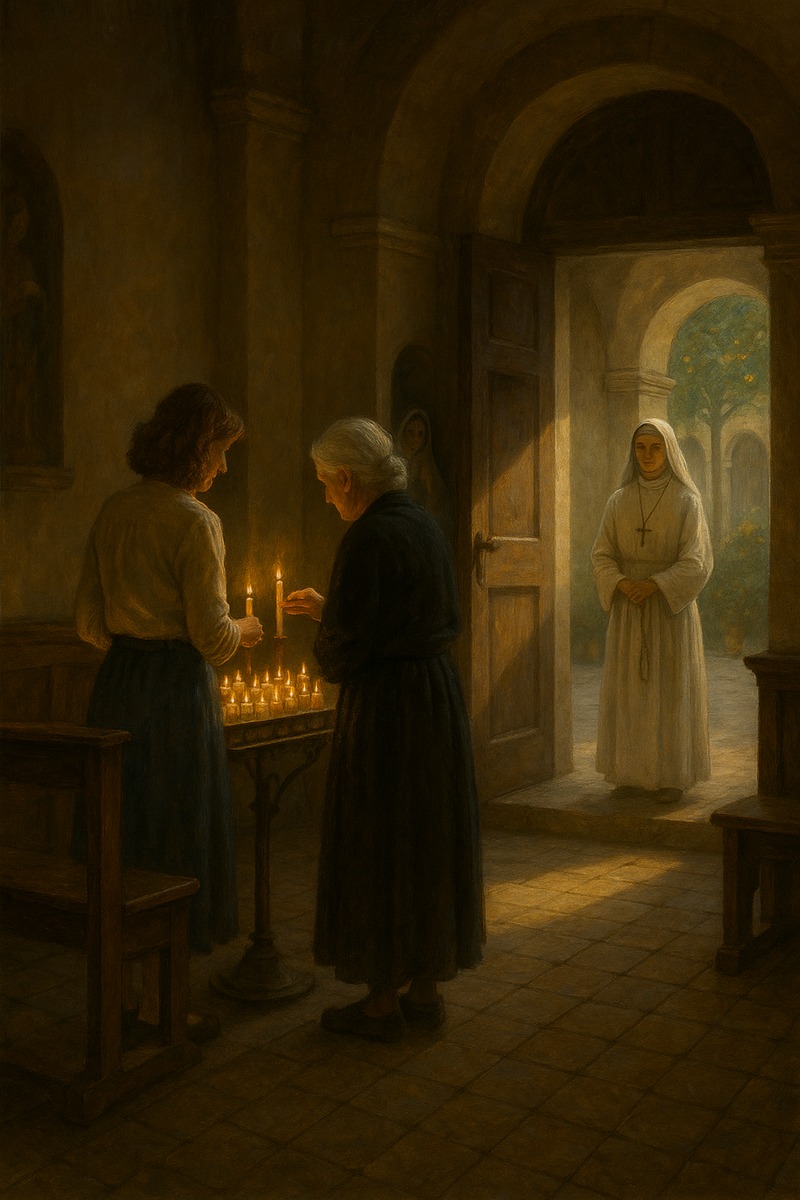
![]()
By Begin Again
.png)
![]()
By Begin Again
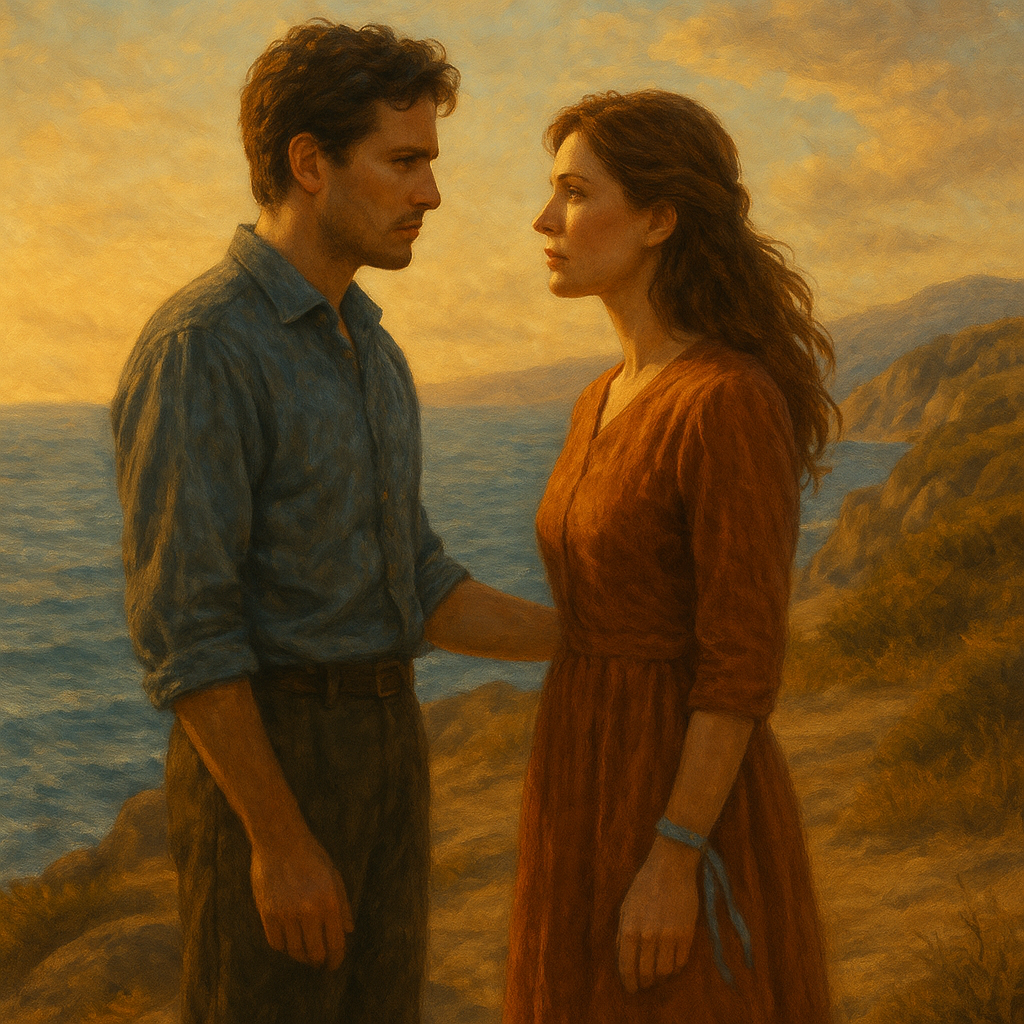
Anna set the receiver back in its cradle and stood a moment, listening to the house breathe. Late light stretched across the courtyard, the hour when voices softened and shutters clicked. When she stepped outside, Luca was waiting by the gate with two paper cups from the café around the corner.
“A gift,” he said, offering one.
Anna smiled. “For me? Why?”
“Just because.”
She took it, the lid warm against her palm. “You didn’t have to.”
“I know, but I wanted to.” He tipped his head toward the lane. “Walk?”
They crossed to the harbor and sat on the low wall, watching the boats bump their moorings. No crowd—just water and a gull that refused to share the rail.
“How did it go?” he asked.
“She finished the journal,” Anna said. “She wants to meet my mom. We’ll meet again tomorrow.”
“That sounds good.”
“I called my mom.”
“And?”
“She didn’t hang up.” Anna’s mouth tilted. “She listened.”
A boy walked along the promenade with a paper tray of fried dough sugared like snow. Luca waved him over, paid, and tore a piece in half. They ate over the water, laughing when the sugar clung to their fingers.
“Food like this should only be eaten in the dark,” he said, licking a thumb. “So no one can see the mess.”
Anna brushed sugar from her cheek. “When storms woke me as a child, my grandmother would sing or tell stories until I fell asleep. She’d bring me sweet things when life felt heavy. I believed nothing could touch us then.”
“She sounds like someone worth remembering,” Luca said.
“She was.” The ache rose; she smiled anyway.
He reached without thinking and wiped the last fleck of sugar from her jaw. The touch lingered one heartbeat longer than necessary. She didn’t pull back.
They walked home as the square hummed behind them. At the gate, he stopped. “I know you’ll go home soon,” he said. “But will you come back?”
“I promised Sister Teresa I would.” Her voice caught. “And I want to.”
Relief softened his face. He leaned in and kissed her, warm and sure, not hurried. When he drew back, he whispered, “So you don’t forget me.”
Anna’s breath shook. “I couldn’t.”
She carried the shape of his smile with her into the night.
*****
Morning broke clear. Before the town had fully woken, Anna and Rosa walked to Santa Lucia. At the gate, Rosa touched Anna’s sleeve. “I’ll wait by the roses.”
Sister Beatrice met them just inside. “She asked if you were coming,” she said, pleased by the answer she already knew. “She waits in the garden.”
Teresa sat on the bench near the fountain, the carved bird cradled in her hands. She rose when Anna entered, then hesitated like someone not quite sure of what was expected.
“Buongiorno,” Anna said softly.
“Buongiorno,” Teresa echoed, and then—unexpectedly—she smiled. “I slept,” she said, a little surprised at herself. “I’m not afraid of what lies ahead.”
“That’s good,” Anna said, feeling the truth of it warm her chest.
Teresa glanced at the far beds where geraniums flared red. “I prayed another foolish prayer last night,” she admitted. “That when your mother comes, my legs will carry me, and my voice will not fail.”
“Your legs will carry you,” Anna said. “And if your voice stutters, she’ll hear you anyway.”
Teresa looked down at the bird. “I should keep this,” she said, “but I want to give you something to bind us.” From the pocket of her habit, she drew a narrow ribbon, faded blue. “It tied the journal—kept our mother’s words together. Let it keep us together until you return.”
Anna’s throat tightened as she took it. “I’ll wear it on my wrist,” she said. “Until we’re back.”
Teresa’s eyes shone. “Tell your mother—” She steadied herself. “Tell Maggie I will stand at the gate when she comes. And if I forget how to speak, tell her I have been waiting all my life, and that I am grateful to her mother and to your grandmother, and to you.”
“I’ll tell her,” Anna said. “Everything.”
They stood for a moment listening to the fountain. Teresa lifted her hand, palm outward in blessing. “May the Lord keep you between here and there,” she said. “May He make straight the path over the water.”
“Amen,” Anna whispered.
The bells tolled and Sister Beatrice appeared, not intruding, simply waiting. Teresa nodded to Anna, then to the Sister, and raised her arms. Anna didn’t hesitate. She stepped into them and they hugged, holding on to a promise that she would return.
At the gate, Anna turned once more and waved goodbye. Teresa raised the carved bird slightly, like a promise held up to the light.
*****
Rosa had coffee waiting in the kitchen. “Well?” she asked, though her eyes already knew.
“She told me she slept,” Anna said, touching the ribbon at her wrist. “She isn’t afraid.”
“Good,” Rosa said, approving this small miracle. She opened a drawer, took out a postcard of Santa Lucia, and wrote the address on the back in neat script. “For your mother,” she said, tucking it into Anna’s hand. “So she sees the place before she sees the place.”
“Thank you.”
Luca came in from the courtyard with a delivery list clipped to a board. He saw the ribbon at Anna’s wrist and the suitcase waiting by the door. “Tomorrow?”
“Tomorrow,” she said.
“Let me call you a taxi in the morning,” he said. “Deliveries start early for me.”
“You don’t have to.”
“I want to,” he said. He stepped closer; the laundry line lifted and settled in the courtyard breeze. A neighbor called his name about two zucchini; he answered with a chin lift, eyes never leaving hers. “I’ll try to make it to the airport. If I’m late, I’ll come straight to the gate.”
“Either way, I’ll see you,” Anna said.
He searched her face. “I don’t want this to end because there’s water between us.”
“It won’t,” she said. “Unless we let it.”
He nodded, like signing his name to a pact. He leaned in and kissed her once, nothing rushed.
They ate something light that evening—tomatoes with salt, bread with oil, and a handful of olives. No one tried to pad the quiet. After the dishes, Anna went upstairs, sat on the edge of the bed, and wrote one line in her notebook: Tomorrow I go home. With or without Mother, I promise to return.
She turned off the lamp. The house settled—the fans hummed, someone tossed a footfall in the courtyard, a chair moved in the kitchen. She let it all be what it was.
*****
The next morning moved quickly. Rosa checked the suitcase zip, pressed a small medal into Anna’s palm, and hugged her so tight it made her laugh.
“For luck,” Rosa said. “For the border between here and there.”
“I’ll bring her back,” Anna said into Rosa’s shoulder. “I will.”
“We’ll be ready.”
A shadow crossed the threshold. Isabella stood there, hair smooth, smile neat. She grinned and called out, "Buongiorno! The day is glorious." She hugged Rosa and gave Anna a nod. "Luca says he won't make it here to see you off," she said lightly. "He told me to say arrivederci — e buon viaggio. He wishes you safe travels."
Anna frowned before she could smooth it away. “You saw Luca?”
“At the coffee shop,” Isabella said, settling a hand on her hip. “He bought me a cappuccino and a pastry. It was our routine. Before you came.” She lifted two fingers in a small wave. “Ciao, Americano.”
Rosa stepped closer and took up the suitcase handle, drawing it beside the door. “Pay no mind to that woman,” she said, quiet but firm. “She is not the one for my son.”
Isabella’s smile thinned. She turned and left without another word.
*****
The taxi idled in the lane. Anna blinked—same driver as the day she arrived. He tipped his cap and lifted her suitcase into the trunk.
“Signorina,” he said warmly. “Back to the airport?”
She nodded and slid into the back seat. The door shut with a soft thud. As they pulled away, Anna kept her gaze on the courtyard gate, as if the right person might appear if she looked hard enough. No one did.
She tried to swallow, but Isabella’s words lodged like a stone. It was our routine. Before you came. The first tear surprised her. Then another. She turned her face toward the window, willing herself to breathe—slow, careful.
In the rearview, the driver’s eyes were kind but not prying. He gave her three quiet streets and then asked, almost conversationally, “Did you enjoy your visit, Signorina?”
Anna pressed the medal in her pocket. Her voice wavered. “Yes.” She cleared her throat. “Much more than I could have imagined.”
He nodded, as if that answer had a shape he recognized. “And did you find what you were looking for?”
She watched the town pass in familiar pieces—shutters propped with spoons, geraniums spilling fire from balconies, the cat draped over a scooter seat. Tears kept coming, but softer now. “I did,” she said. “And more.”
“Bene,” he said. “Sometimes Sicily gives exactly what is needed, and sometimes she adds something you did not know to ask for.”
Anna let out a breath that trembled and steadied. She unfolded the postcard in her lap, ran her thumb over Rosa’s neat script. “Someone tried to make me doubt it, just now.”
The driver’s mouth twitched, almost a smile. “There is always someone,” he said. “But also—there is always you.” He tapped the steering wheel. “What you know inside. Keep that.”
They climbed the road along the harbor. Sun glazed the water. The driver glanced at her gently. “Will you return soon?”
The answer rose from a place that didn’t belong to fear. “Yes,” she said. “As soon as I can.”
“Then Sicily will wait,” he said. He pulled to the curb, stepped out, and set her bag at her feet as if it mattered. “Buon viaggio, Signorina. Until next time.”
“Until next time,” Anna echoed. Her eyes were still wet, but the ground under them felt solid. She lifted the handle and walked inside.
![]()
By Begin Again
.png)
| Author Notes | Thank you for joining me on this journey. I hope you enjoy it. Next up: a new story beginsâÂÂUntold Story (The Photograph)âÂÂwhere a daughter opens a handbag and finds a past her mother never spoke aloud. |
![]()
By Begin Again
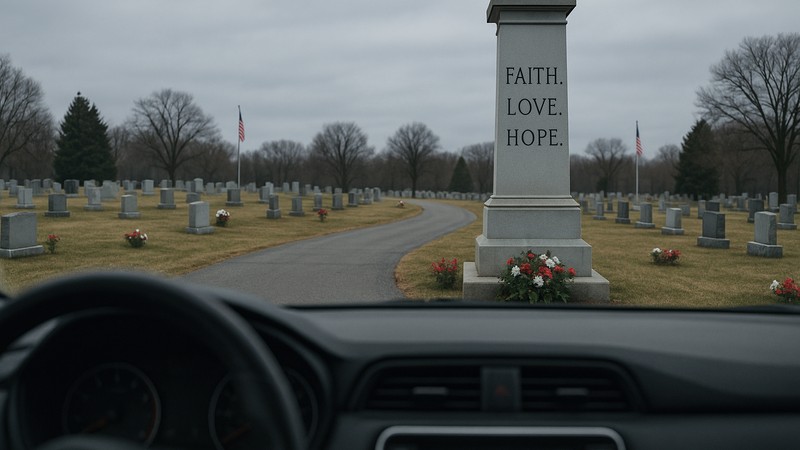
| Author Notes | This is the third story within Yesterday's Dreams. I hope you enjoy it as much as The Forgotten Dress and By the Sea. Thank you for continuing to follow the series. Have a great day! |
![]()
By Begin Again
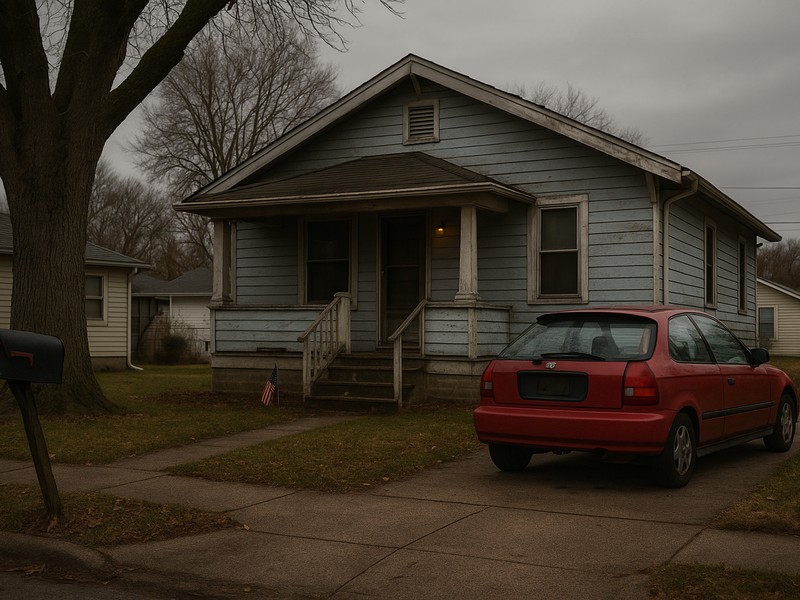
“Sorry, Mark. I came to help, and that’s what I will do.” More words she regretted saying, but ones she knew she had to keep.
![]()
By Begin Again
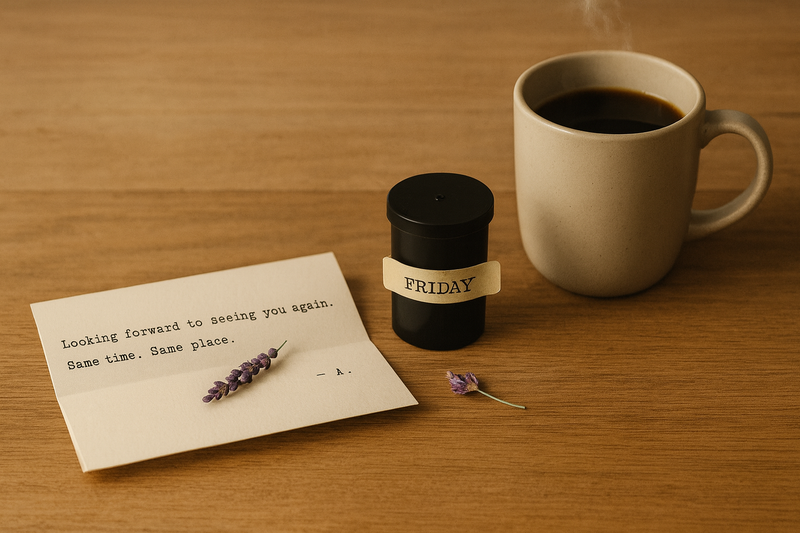
![]()
By Begin Again
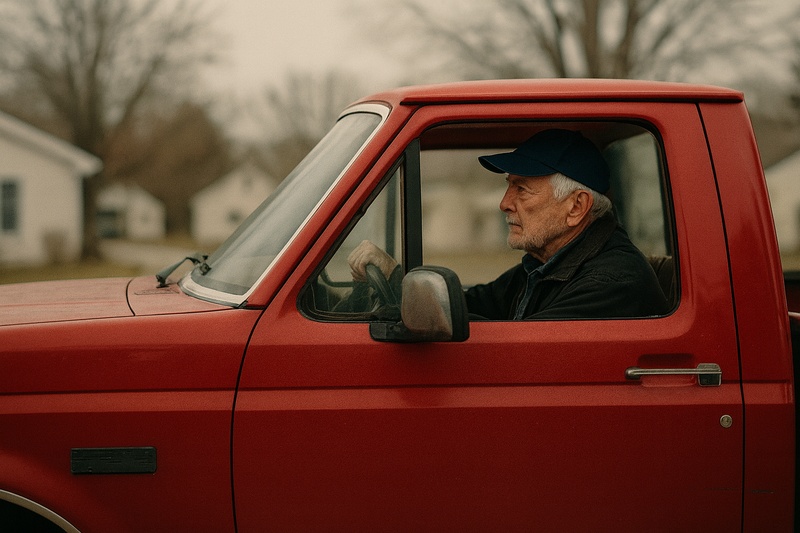
![]()
By Begin Again
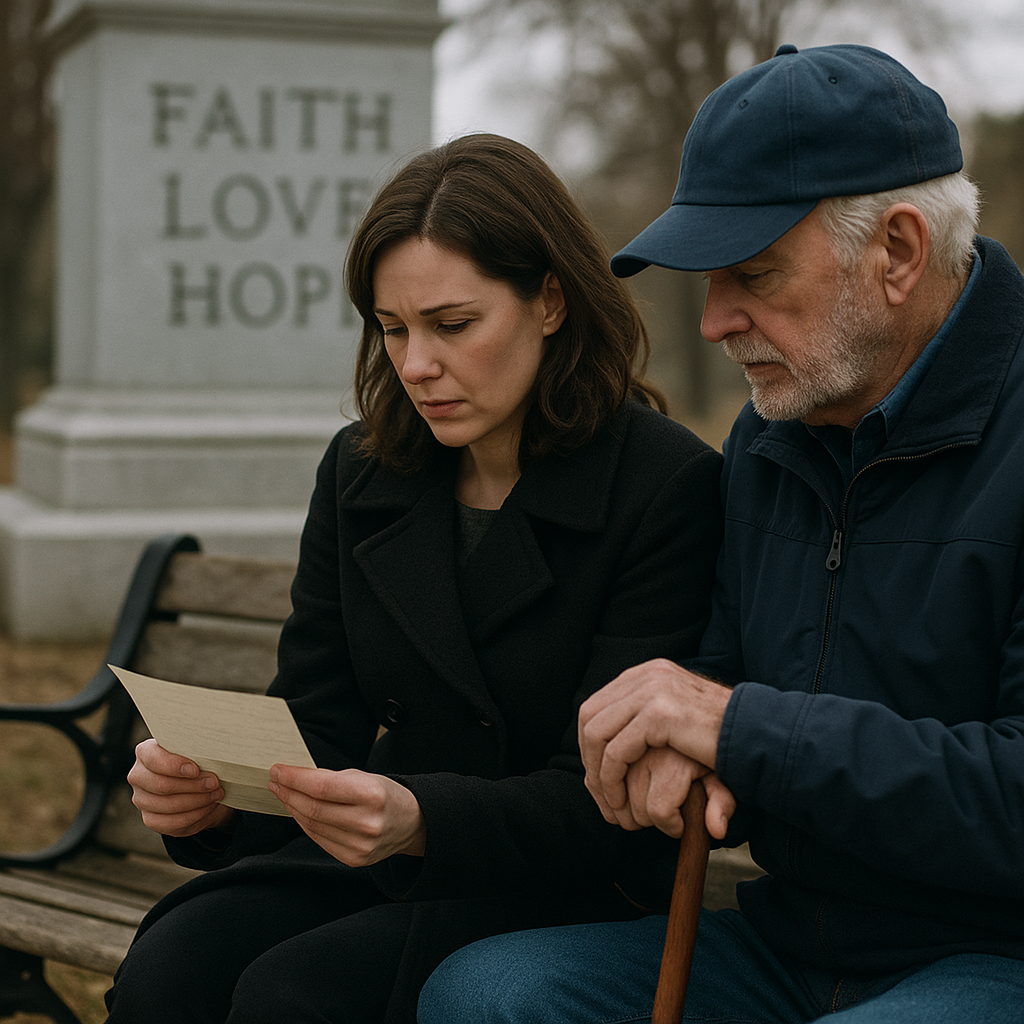
![]()
By Begin Again
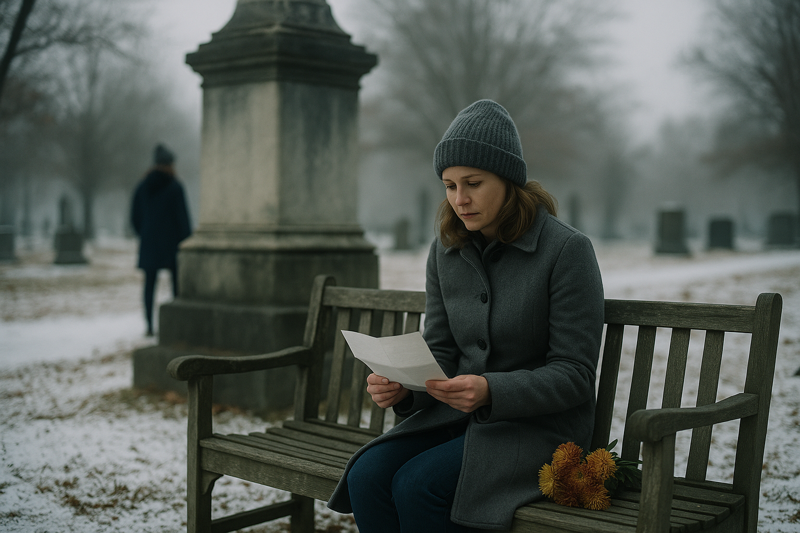
![]()
By Begin Again

| Author Notes | I apologize that this one got long... I got wrapped up in it, and it wouldn't end. I hope the chapter was worth the extra time. Thank you so much. |
![]()
By Begin Again
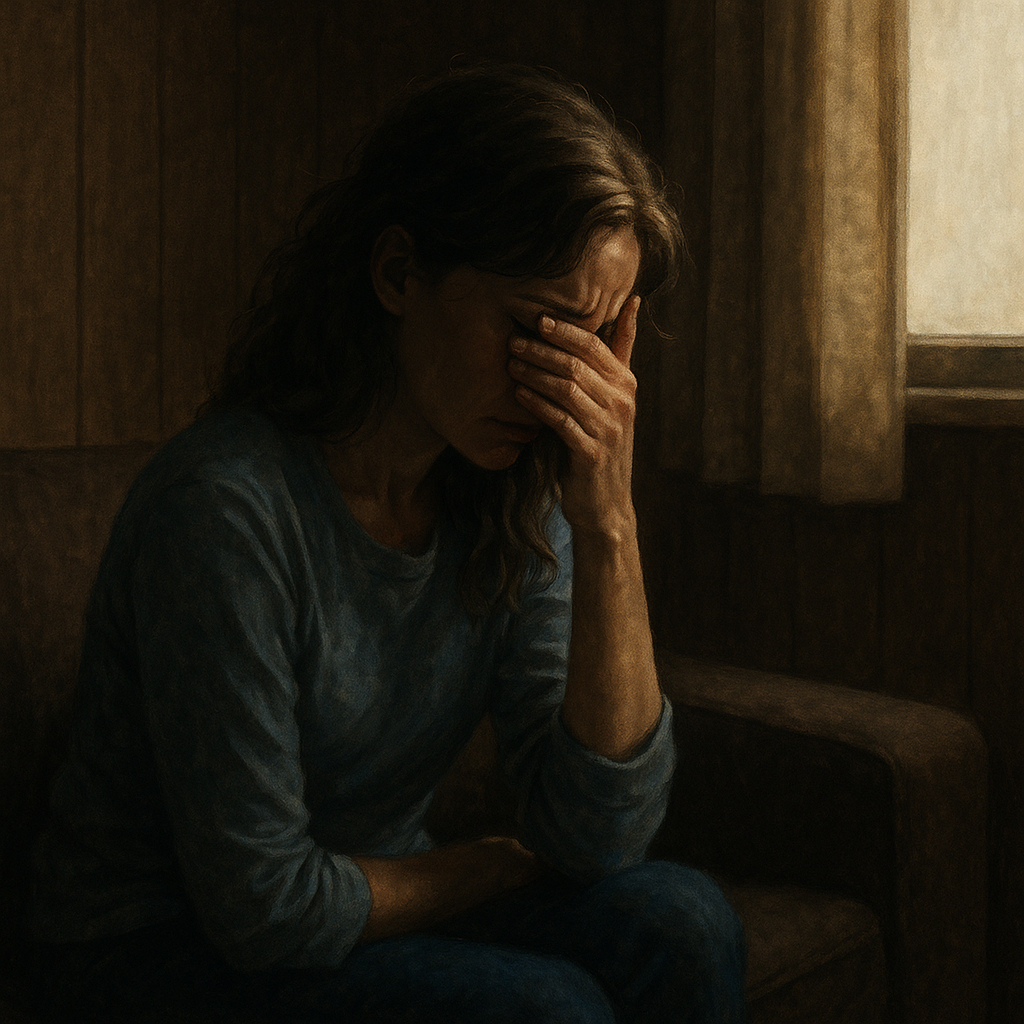
![]()
By Begin Again
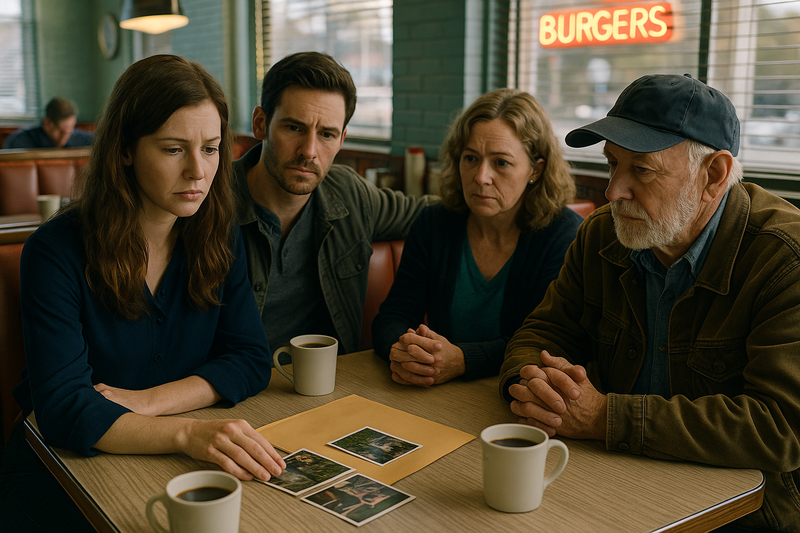
![]()
By Begin Again
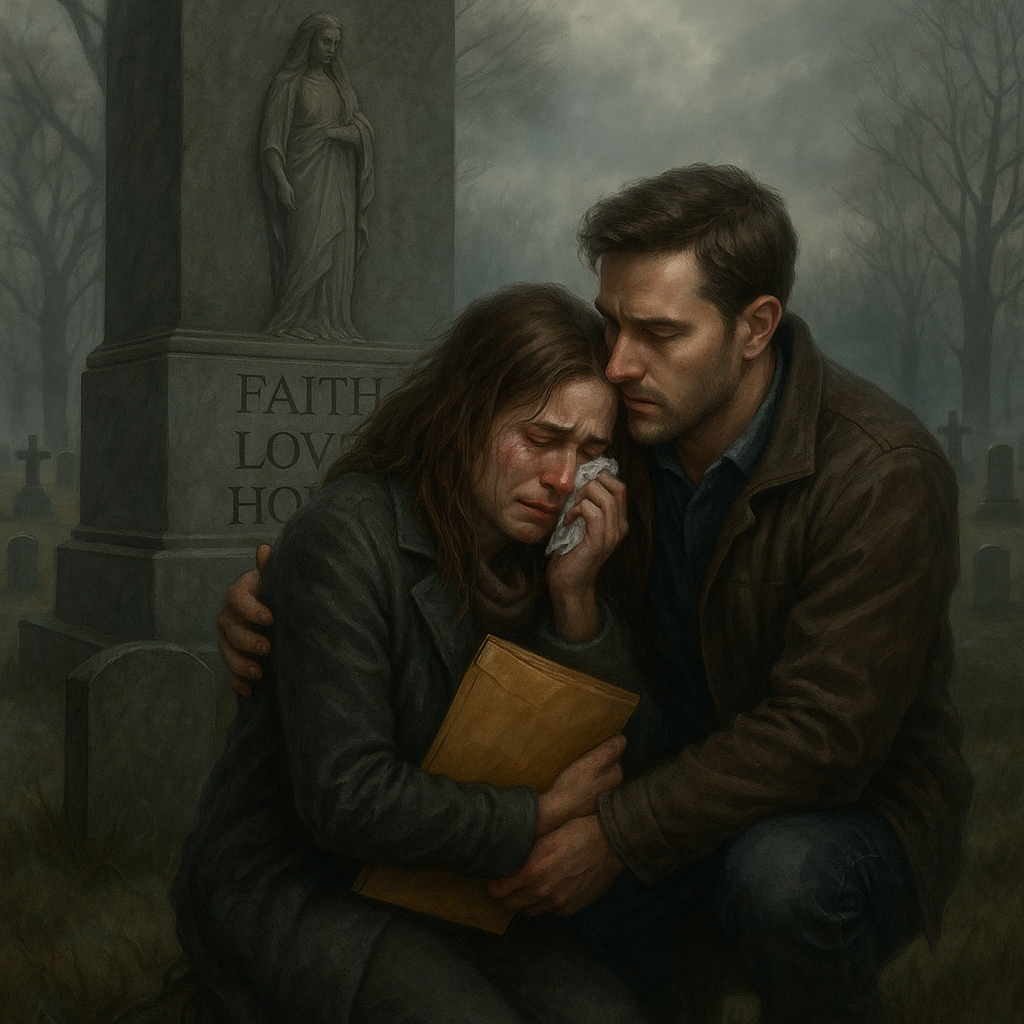
![]()
By Begin Again

![]()
By Begin Again
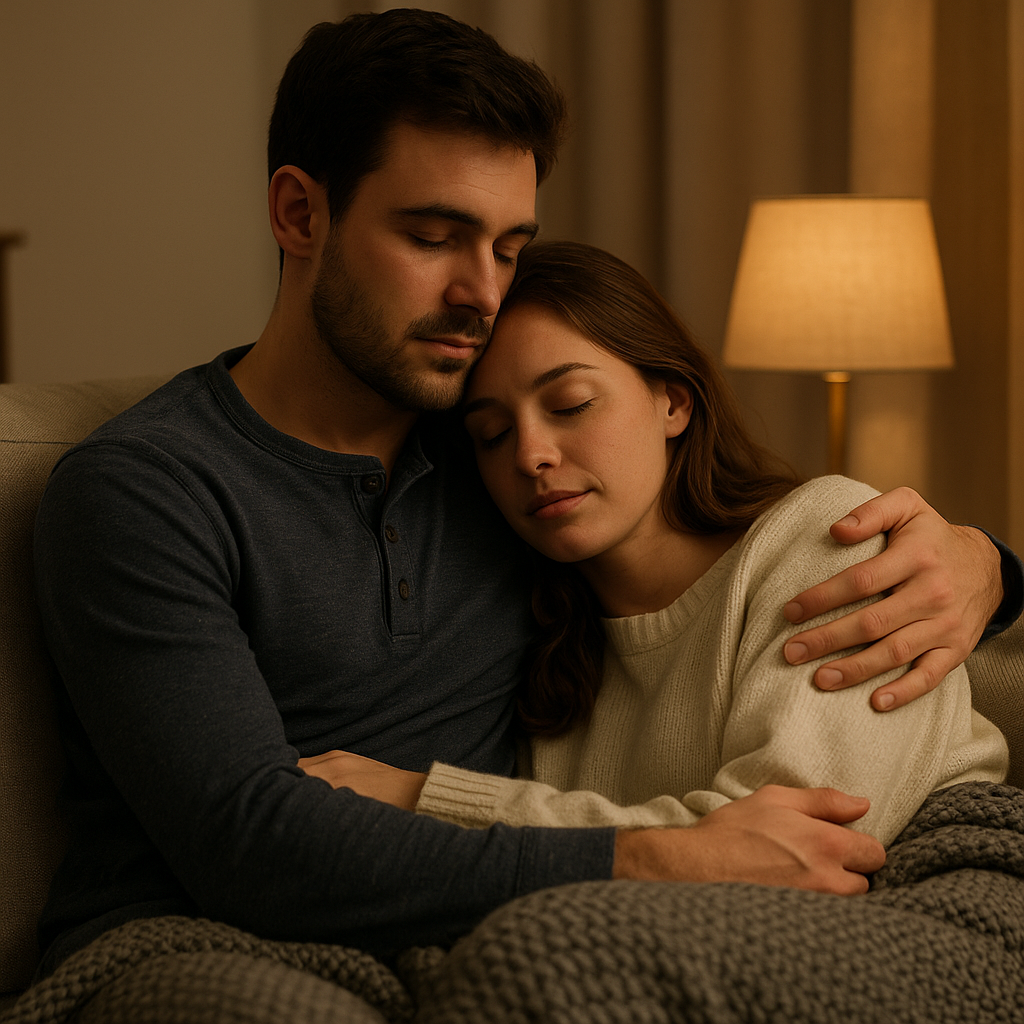
![]()
By Begin Again
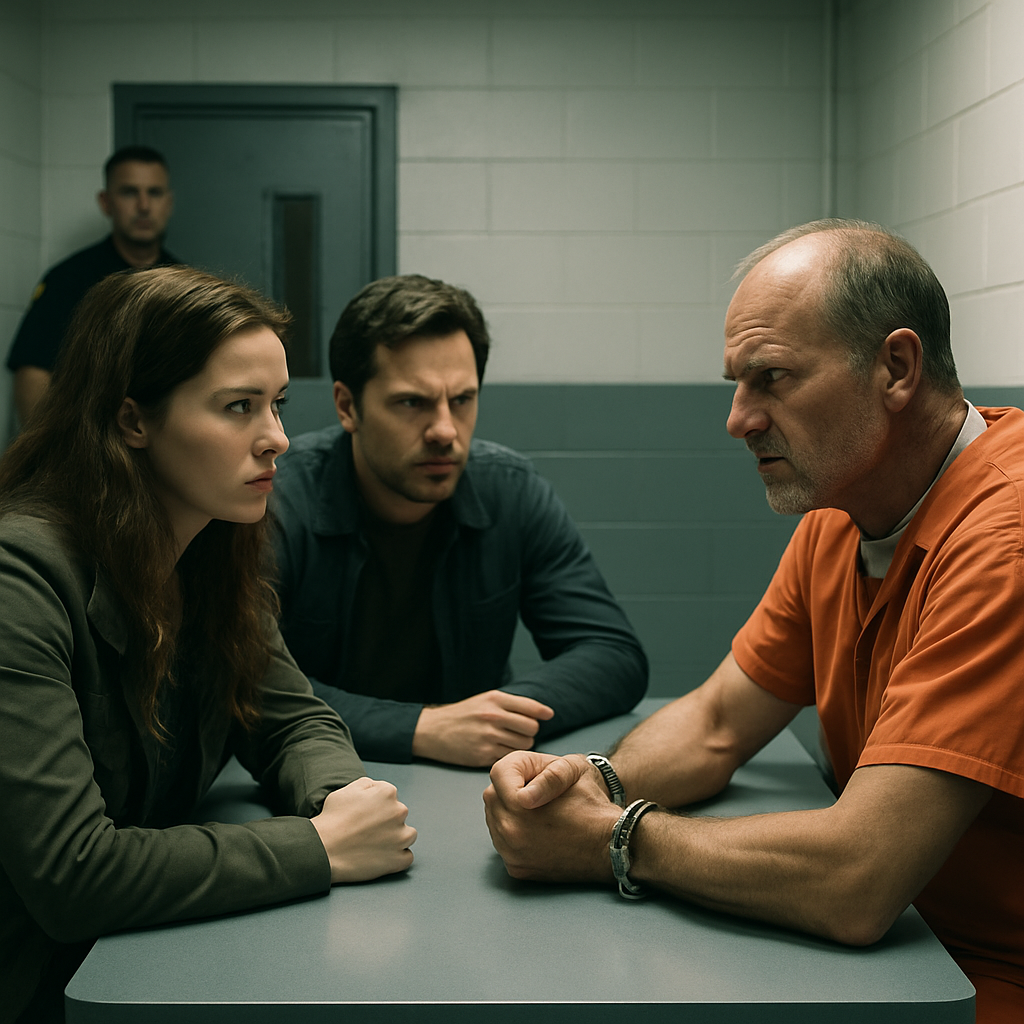
![]()
By Begin Again

![]()
By Begin Again
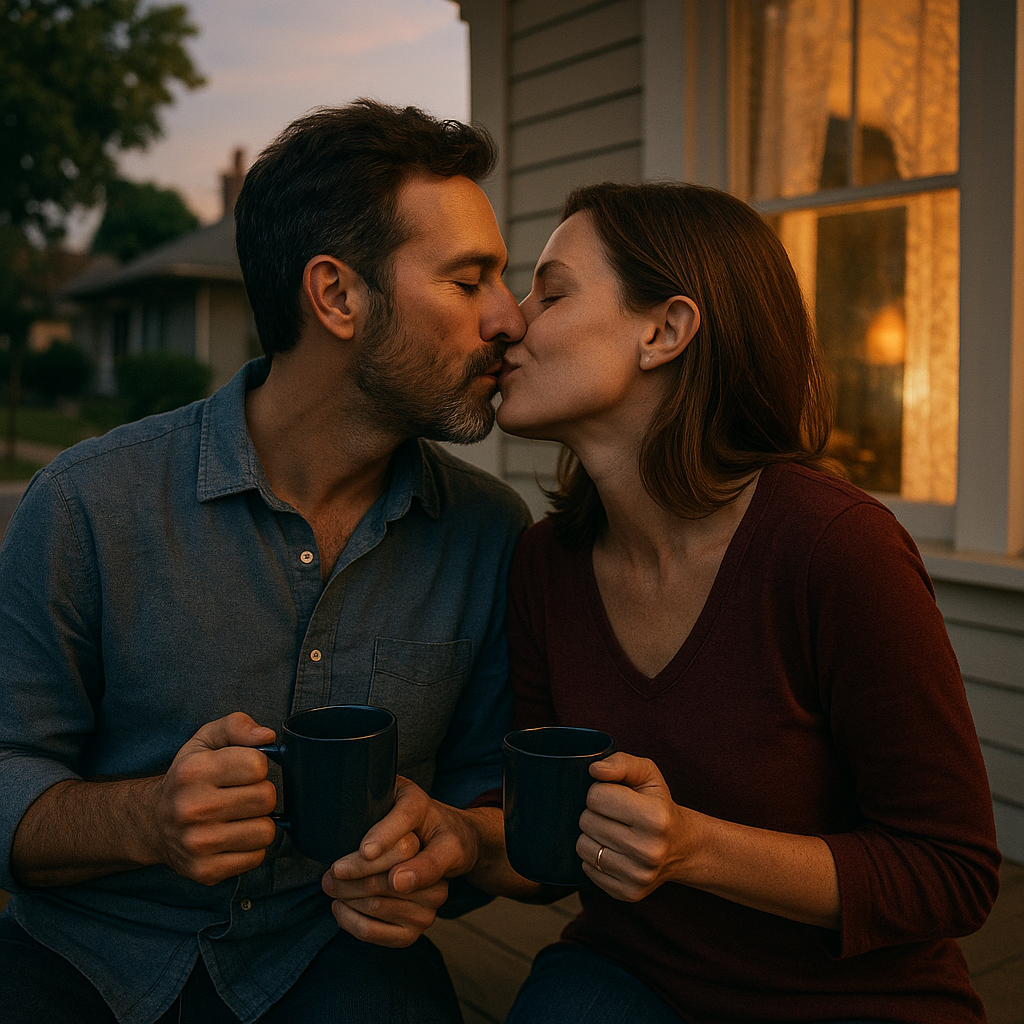
![]()
By Begin Again
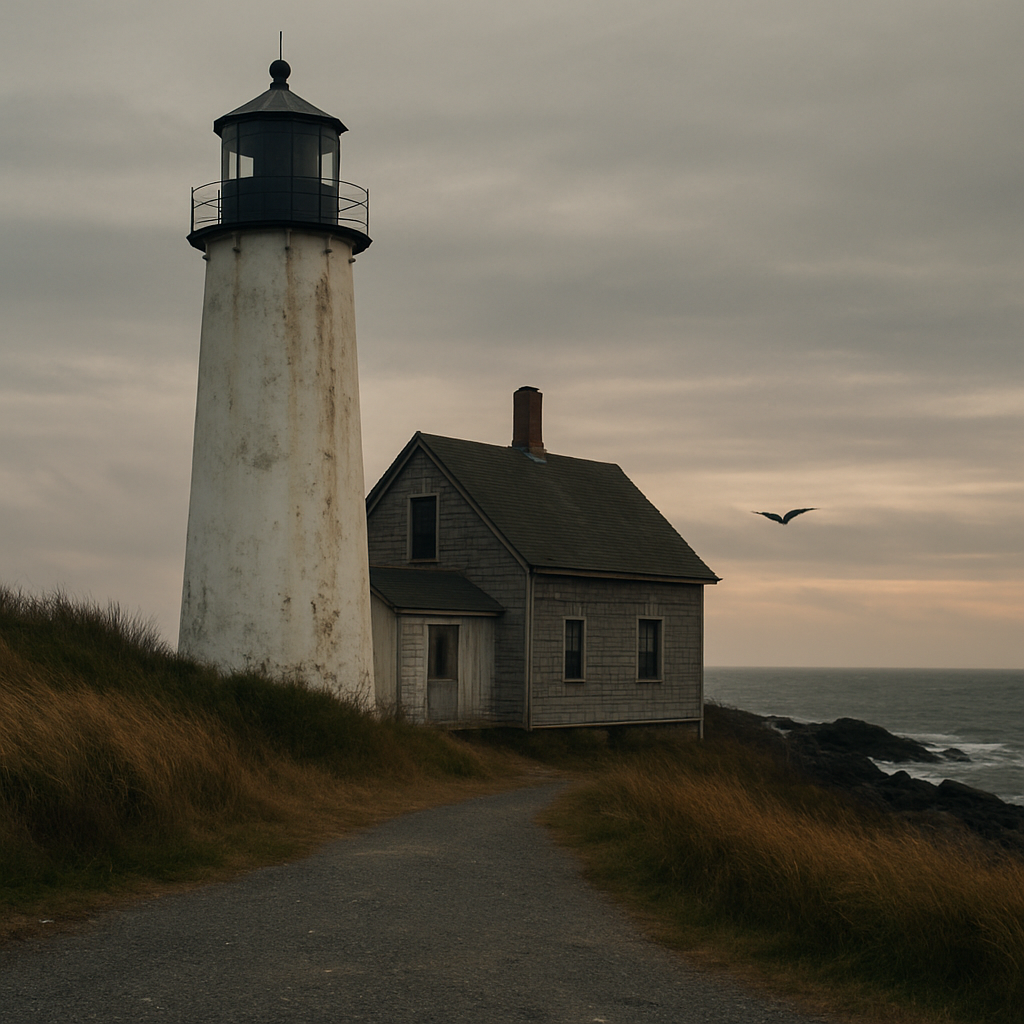
Author’s Note
This is the fourth and final story in Yesterday’s Dreams, following The Forgotten Dress, By The Sea, and The Untold Story. It is a stand-alone novella filled with romance and mystery.
This final story in Yesterday’s Dreams brings Claire home to scatter her father's ashes and close a door—on grief, the lighthouse, and the past. Instead, she finds a locket, a name, and a question that belongs to more than one family. A planned goodbye becomes a quiet search for what really happened—and what should happen next.
![]()
By Begin Again
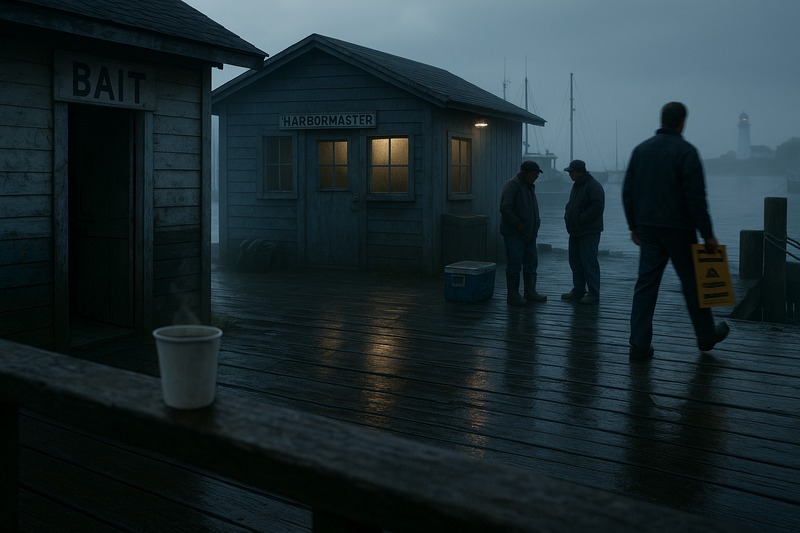
![]()
By Begin Again
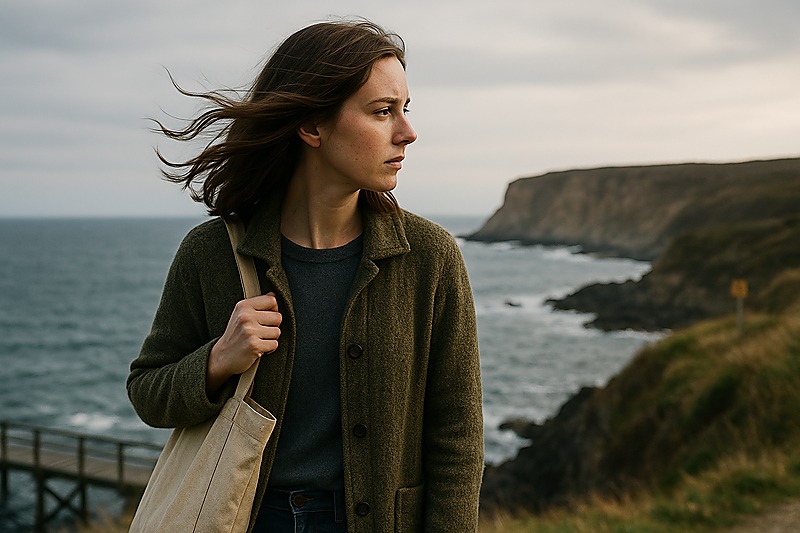
![]()
By Begin Again
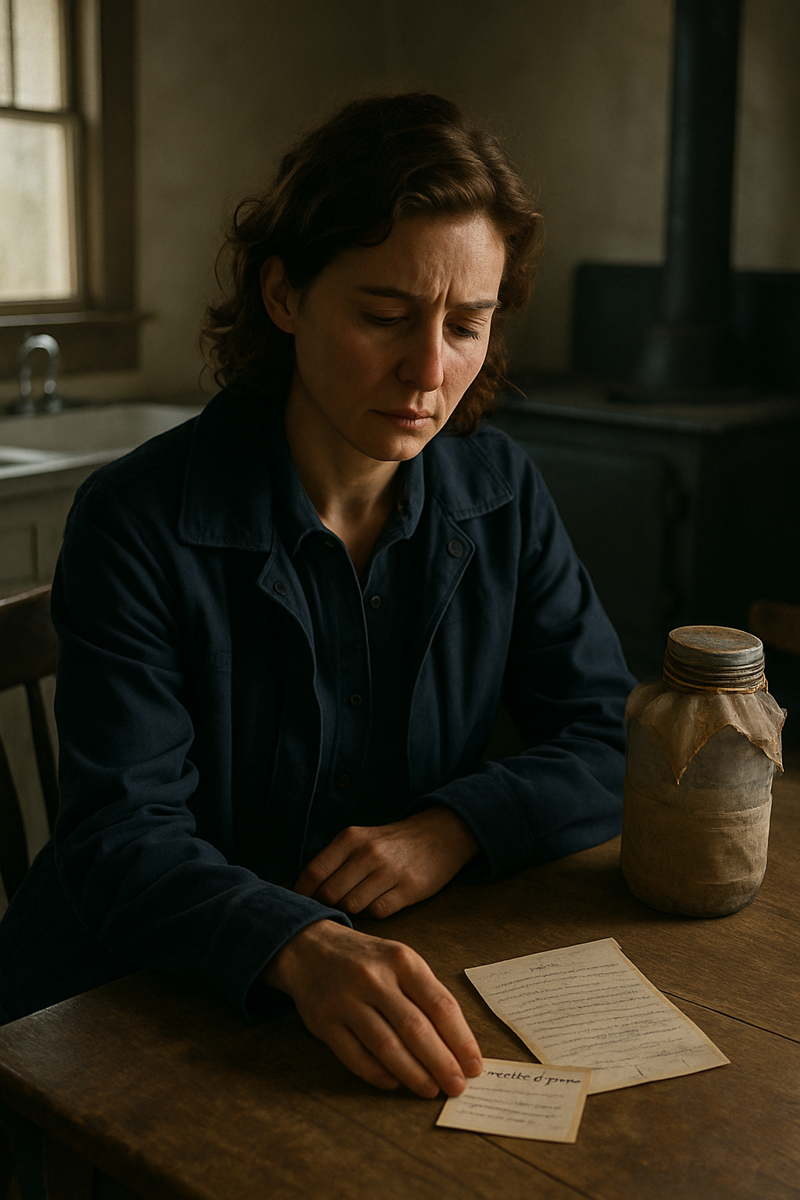
![]()
By Begin Again
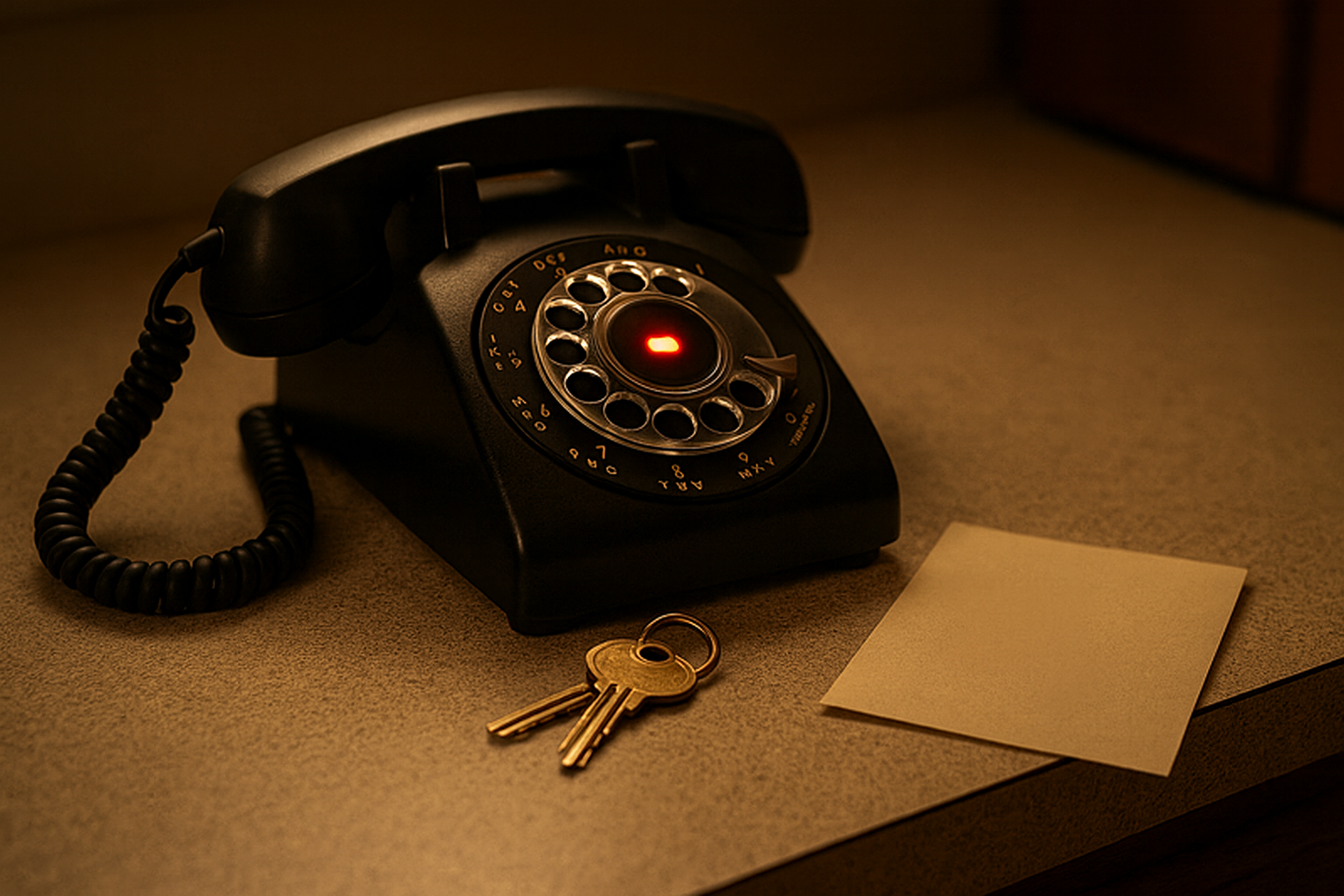
![]()
By Begin Again
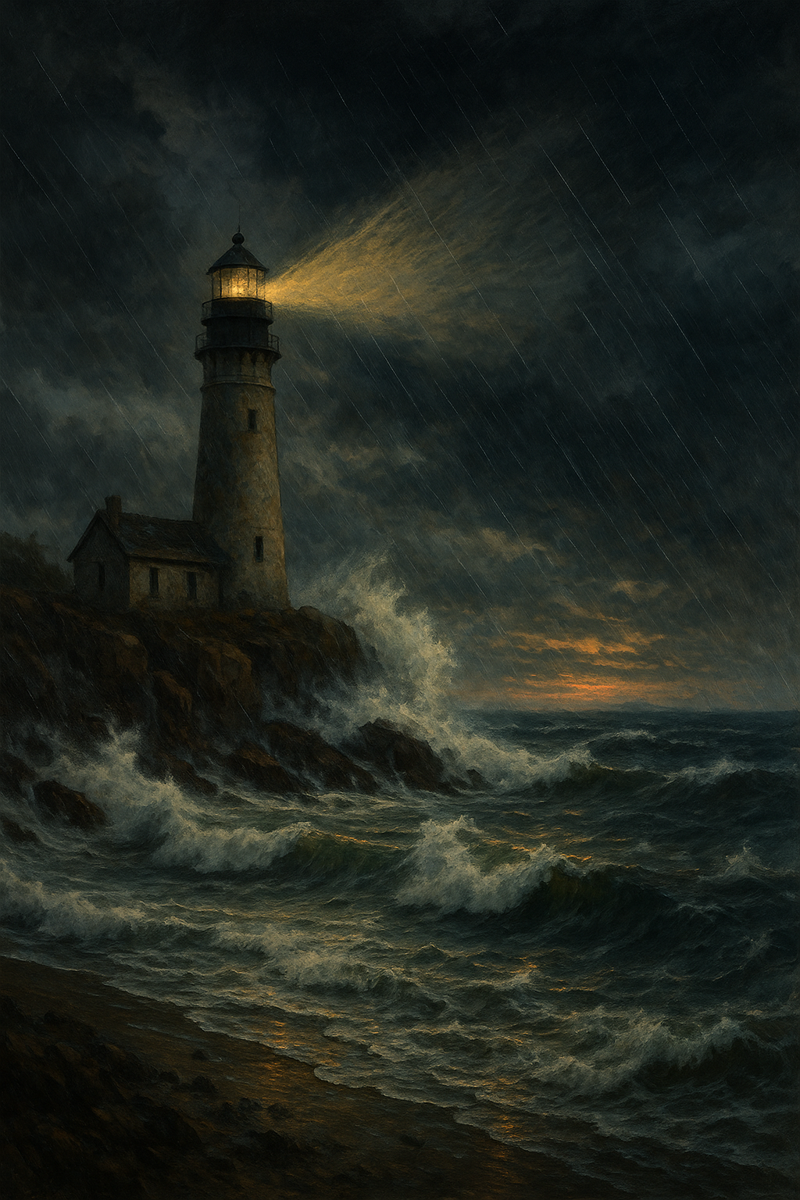
![]()
By Begin Again
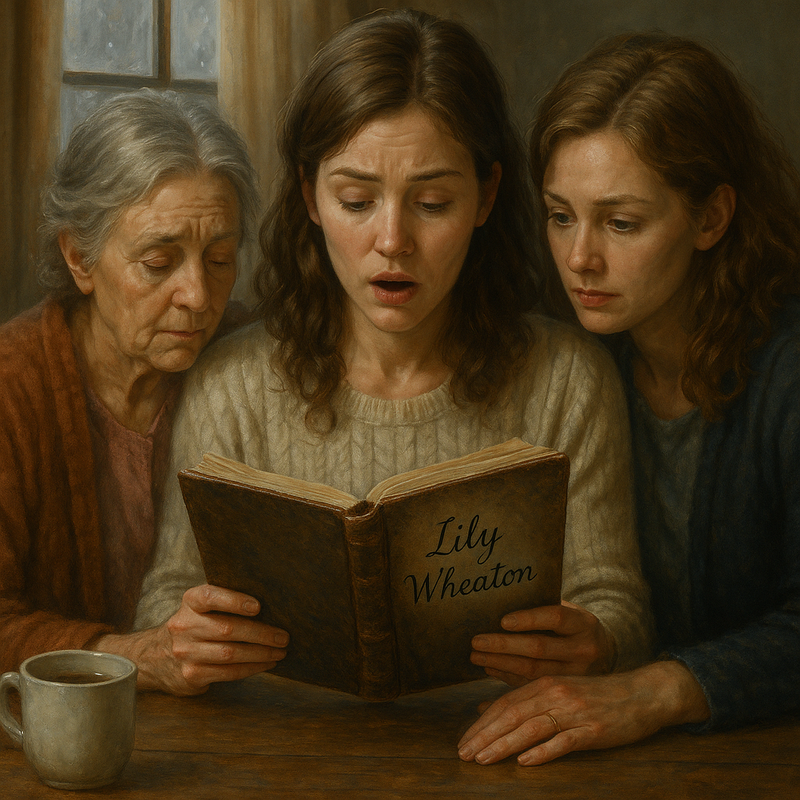
February 8 — Dear Diary… I was beginning to believe it had been a dream, but today I saw him again on Main Street. I wanted to speak to him — to hear his voice — but Father pulled me away. He mumbled something about the lower class. I didn't understand.
Tonight, I will dream of him and hope that he dreams of me."
Ruth nodded. "That sounds like Harry Wheaton. He always felt he was better than most."
Lucy bit her lip. "It's like she was alone, with nothing but her dreams and a diary to share her thoughts."
Claire waited for Lucy's emotions to settle and then asked, "Do you want me to go on?"
Lucy nodded. "Yes. I think she'd want to know that we cared, we listened, even if we couldn't change a thing."
Claire began—
February 14—Valentine's Day. I saw Douglas at the pier. Our eyes met, and my body grew warm beneath his look. He didn't wave—too many eyes. But the quick lift of his chin felt like a promise. When he smiled, it felt like a kiss.
Lucy swallowed hard. "I can't imagine that kind of love. Unspoken, yet felt so deeply." She ran her fingers across the page as if to touch the woman speaking. "Please, read some more, Claire."
"Are you sure you wouldn't read it yourself?"
"No. I want all of us to feel her love —and, I imagine, her pain. She shouldn't have been alone, but she was—maybe somehow, she can feel us and know we care."
Claire picked up the diary and read again—
February 17—Dear Diary
We stood two people apart in the picture house line. He bought a ticket for the same matinee. We sat with an empty row between us. When the lights came up, we left by the side door. Our hands brushed. I'm still tingling with the thought.
February 22—Dear Diary
I went to the library today, and he was there, almost as if he planned it. He slipped a note into the coastal almanac: Wednesday, three o'clock, south steps. I nodded without looking up. The librarian stamped the due date, and my hands shook. He smiled and then walked away.
The room lost its warmth as he left, but then I remembered the note, and it felt like a hug. I've not shared a moment alone with him, but I know without a doubt, I am in love.
February 25—Dear Diary
Today, time stood still. I thought three o'clock would never arrive. I hurried to the back of the library. My heart sank because he wasn't there.
Seconds later, he appeared. He said he didn't want to cause trouble. I said trouble had already found us. He held my hands in his for a moment. He said, "Tomorrow. The pier."
February 26—Dear Diary
We walked the pier in opposite directions and met in the middle like strangers. He said my name very quietly. I said his. Father was farther down, talking to Mr. Crandon. We didn't touch, yet I felt like we did.
March 1—Dear Diary
Post office line. He stood behind me and said he hoped the rain would hold. I said I hoped for the same. The clerk asked if I needed stamps. I said yes just to keep standing there.
March 5—Dear Diary
Today, Father sent me to Wexington to pick up some letters from a lawyer. I climbed on the bus and chose a seat in the back. As the doors were closing, he climbed aboard.
I thought I would faint on the spot. He smiled and sat beside me. To others, we were strangers talking, but to me, it was so much more.
His stop was one town before mine. The bus felt empty when he was gone. He said he'd be at the pier tomorrow.
March 6—Dear Diary
Fate played a hand today. Father was busy with some businessmen and handed me a ticket to take the afternoon tourist cruise — a luncheon and scenic sights. It was his way of keeping me in one spot, I suppose.
Since the cruise was empty, I took a table at the top. As we left the pier, a voice asked if he could join me. It was Douglas. He'd seen me board and quickly bought a ticket.
Father would have been furious had he known. But I was in heaven. An hour alone and plans to meet again.
Claire turned the next page and stopped. The paper was wrinkled and stuck at the corner, watermarked across the dates. Several entries were smeared beyond reading; half a line survived: "Father is taking a business trip."
Lucy's hand found Ruth's on the table and stayed there.
Claire turned the page.
April 3—Dear Diary
Father leaves tomorrow night. Douglas and I will finally be together for an entire day. We planned it during prayers at church, whispering like schoolchildren. He's borrowed a car.
April 5—Dear Diary
It rained all day, but it didn't matter. Douglas found a little beach motel along the highway. We ate chow mein from paper boxes and laughed into the pillows so no one would hear. He said someday we'd eat in the open. I told him that as long as I was with him, it didn't matter.
Lucy blinked hard but didn't look away. "What a love affair," she said.
More pages were water-damaged and stuck together. Claire turned till she found one she was able to read. She traced the date, then drew back a fraction. "Oh… I didn't expect that."
Lucy leaned in. "What is it?"
| Author Notes |
Cast of Characters
Claire Crandon ó A writer and historian returning to her hometown after her father's death. Determined to restore the lighthouse and uncover the truth behind the secrets her father left behind. David Reed ó Contractor overseeing the lighthouse restoration. Grandson of Douglas Reed, a man whose lost love and unanswered letter lie at the heart of the mystery. Steady, grounded, and quietly protective. Lucy Crandon ó Claire's cousin, raised by Ruth. Outspoken and loyal, but shaken when she learns the truth about her birth and the secrets that bound her family for decades. Ruth Crandon ó Claire's aunt and Lucy's adoptive mother. Fiercely protective, burdened by the promise she made long ago to keep a secret that has cost her nearly everything. Andrew Crandon ó Claire's late father. The former lighthouse keeper who pieced together fragments of a long-buried truth and left a trail for his daughter to follow. Lily Wheaton ó A young woman from the past whose forbidden love with Douglas Reed and tragic fate shaped the lives of everyone on the point. Douglas Reed ó David's grandfather and Lily's lost love. A man of quiet honor who never knew the truth about the child he left behind. Gideon Pike ó The harbor master. Rugged, loyal to the sea, and always first to answer a distress call. Harper Benton ó Owner of the general store. A practical man with a good heart and a hand in every town effort. Dr. Avery ó The retired town physician who once delivered a baby at the lighthouse on a storm-tossed night forty years ago. Trudy Lansbury ó A persistent reporter from The Gazette, digging into local history and stirring up truths some would rather stay buried. |
![]()
By Begin Again

![]()
By Begin Again
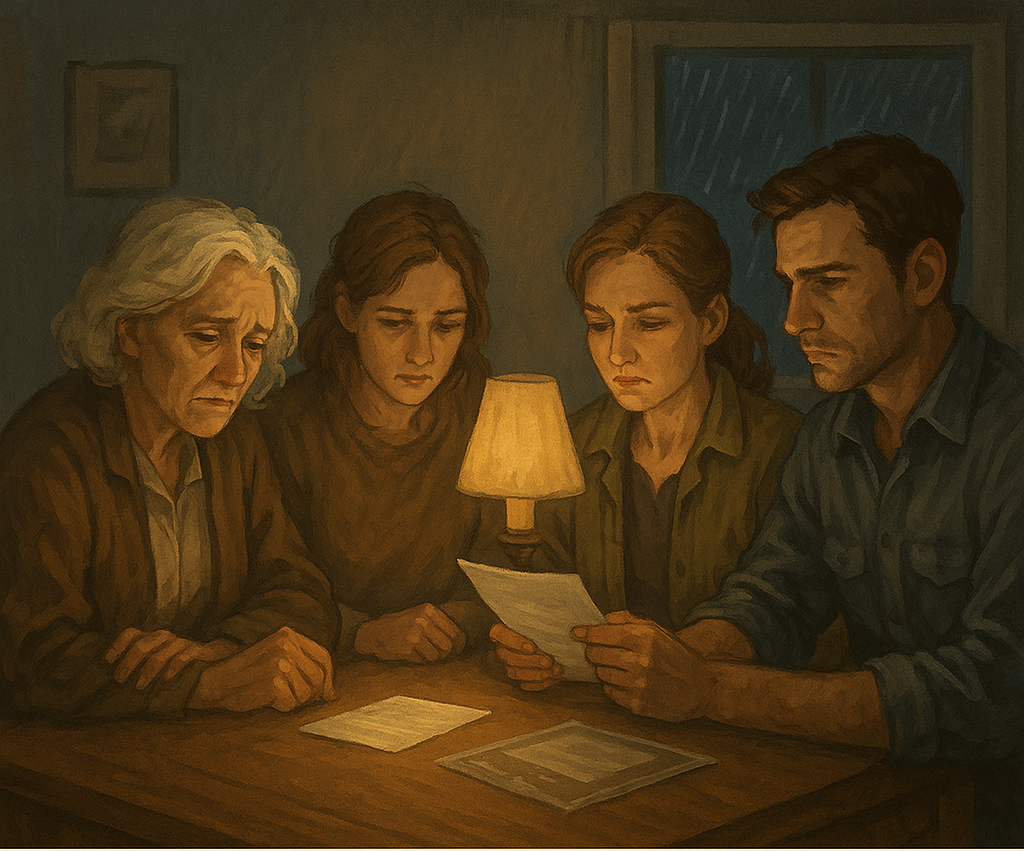
| Author Notes |
Cast of Characters
Claire Crandon â A writer and historian returning to her hometown after her fatherâs death. Determined to restore the lighthouse and uncover the truth behind the secrets her father left behind. David Reed â Contractor overseeing the lighthouse restoration. Grandson of Douglas Reed, a man whose lost love and unanswered letter lie at the heart of the mystery. Steady, grounded, and quietly protective. Lucy Crandon â Claireâs cousin, raised by Ruth. Outspoken and loyal, but shaken when she learns the truth about her birth and the secrets that bound her family for decades. Ruth Crandon â Claireâs aunt and Lucyâs adoptive mother. Fiercely protective, burdened by the promise she made long ago to keep a secret that has cost her nearly everything. Andrew Crandon â Claireâs late father. The former lighthouse keeper who pieced together fragments of a long-buried truth and left a trail for his daughter to follow. Lily Wheaton â A young woman from the past whose forbidden love with Douglas Reed and tragic fate shaped the lives of everyone on the point. Douglas Reed â Davidâs grandfather and Lilyâs lost love. A man of quiet honor who never knew the truth about the child he left behind. Gideon Pike â The harbor master. Rugged, loyal to the sea, and always first to answer a distress call. Harper Benton â Owner of the general store. A practical man with a good heart and a hand in every town effort. Dr. Avery â The retired town physician who once delivered a baby at the lighthouse on a storm-tossed night forty years ago. Trudy Lansbury â A persistent reporter from The Gazette, digging into local history and stirring up truths some would rather stay buried. |
![]()
By Begin Again
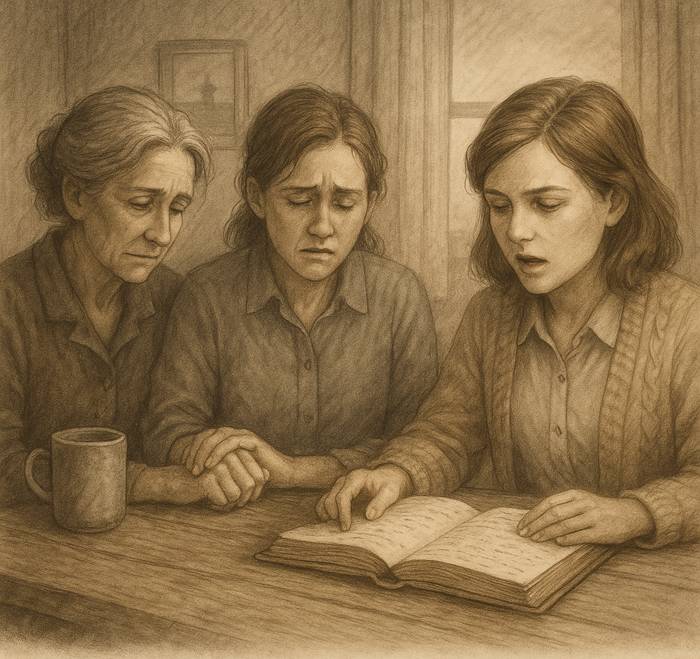
| Author Notes |
Cast of Characters
Claire Crandon ó A writer and historian returning to her hometown after her father's death. Determined to restore the lighthouse and uncover the truth behind the secrets her father left behind. David Reed ó Contractor overseeing the lighthouse restoration. Grandson of Douglas Reed, a man whose lost love and unanswered letter lie at the heart of the mystery. Steady, grounded, and quietly protective. Lucy Crandon ó Claire's cousin, raised by Ruth. Outspoken and loyal, but shaken when she learns the truth about her birth and the secrets that bound her family for decades. Ruth Crandon ó Claire's aunt and Lucy's adoptive mother. Fiercely protective, burdened by the promise she made long ago to keep a secret that has cost her nearly everything. Andrew Crandon ó Claire's late father. The former lighthouse keeper who pieced together fragments of a long-buried truth and left a trail for his daughter to follow. Lily Wheaton ó A young woman from the past whose forbidden love with Douglas Reed and tragic fate shaped the lives of everyone on the point. Douglas Reed ó David's grandfather and Lily's lost love. A man of quiet honor who never knew the truth about the child he left behind. Gideon Pike ó The harbor master. Rugged, loyal to the sea, and always first to answer a distress call. Harper Benton ó Owner of the general store. A practical man with a good heart and a hand in every town effort. Dr. Avery ó The retired town physician who once delivered a baby at the lighthouse on a storm-tossed night forty years ago. Trudy Lansbury ó A persistent reporter from The Gazette, digging into local history and stirring up truths some would rather stay buried. |
![]()
By Begin Again
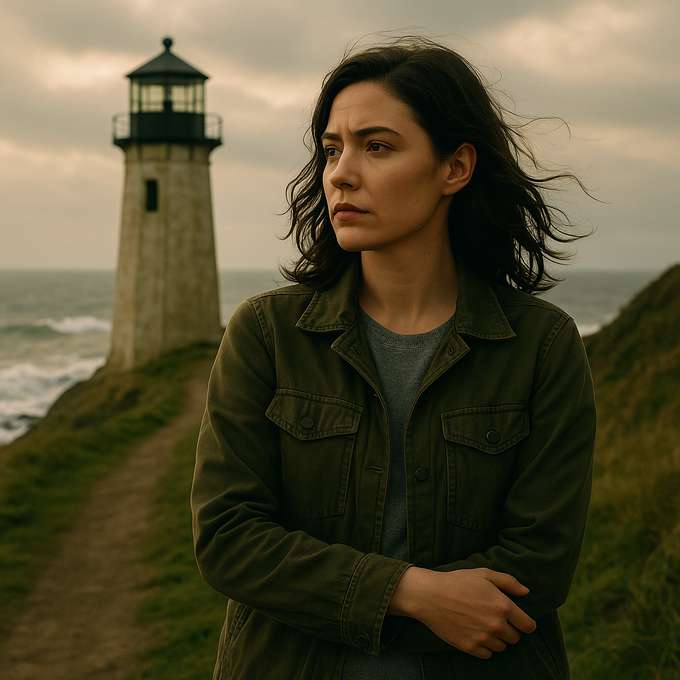
| Author Notes |
Cast of Characters
Claire Crandon ó A writer and historian returning to her hometown after her father's death. Determined to restore the lighthouse and uncover the truth behind the secrets her father left behind. David Reed ó Contractor overseeing the lighthouse restoration. Grandson of Douglas Reed, a man whose lost love and unanswered letter lie at the heart of the mystery. Steady, grounded, and quietly protective. Lucy Crandon ó Claire's cousin, raised by Ruth. Outspoken and loyal, but shaken when she learns the truth about her birth and the secrets that bound her family for decades. Ruth Crandon ó Claire's aunt and Lucy's adoptive mother. Fiercely protective, burdened by the promise she made long ago to keep a secret that has cost her nearly everything. Andrew Crandon ó Claire's late father. The former lighthouse keeper who pieced together fragments of a long-buried truth and left a trail for his daughter to follow. Lily Wheaton ó A young woman from the past whose forbidden love with Douglas Reed and tragic fate shaped the lives of everyone on the point. Douglas Reed ó David's grandfather and Lily's lost love. A man of quiet honor who never knew the truth about the child he left behind. Gideon Pike ó The harbor master. Rugged, loyal to the sea, and always first to answer a distress call. Harper Benton ó Owner of the general store. A practical man with a good heart and a hand in every town effort. Dr. Avery ó The retired town physician who once delivered a baby at the lighthouse on a storm-tossed night forty years ago. Trudy Lansbury ó A persistent reporter from The Gazette, digging into local history and stirring up truths some would rather stay buried. |
![]()
By Begin Again
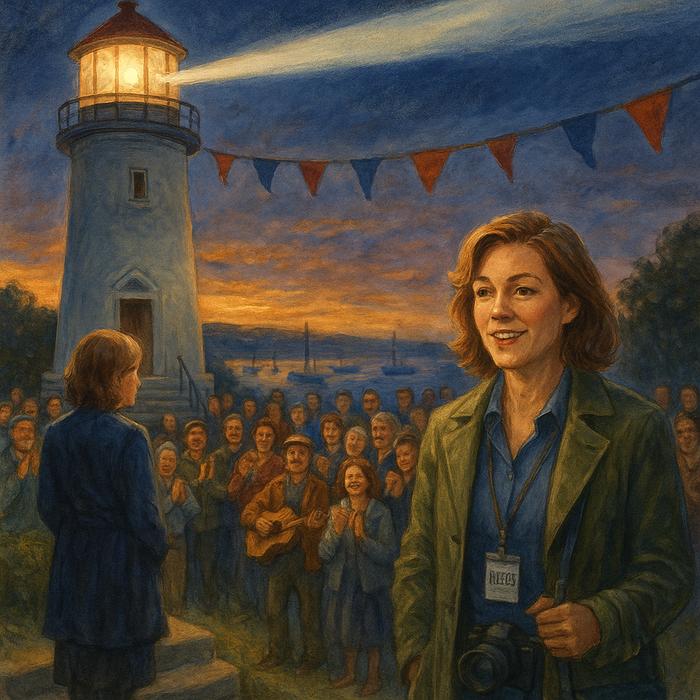
| Author Notes |
Cast of Characters
Claire Crandon ó A writer and historian returning to her hometown after her father's death. Determined to restore the lighthouse and uncover the truth behind the secrets her father left behind. David Reed ó Contractor overseeing the lighthouse restoration. Grandson of Douglas Reed, a man whose lost love and unanswered letter lie at the heart of the mystery. Steady, grounded, and quietly protective. Lucy Crandonó Claire's cousin, raised by Ruth. Outspoken and loyal, but shaken when she learns the truth about her birth and the secrets that bound her family for decades. Ruth Crandon ó Claire's aunt and Lucy's adoptive mother. Fiercely protective, burdened by the promise she made long ago to keep a secret that has cost her nearly everything. Andrew Crandon ó Claire's late father. The former lighthouse keeper who pieced together fragments of a long-buried truth and left a trail for his daughter to follow. Lily Wheaton ó A young woman from the past whose forbidden love with Douglas Reed and tragic fate shaped the lives of everyone on the point. Douglas Reed ó David's grandfather and Lily's lost love. A man of quiet honor who never knew the truth about the child he left behind. John Reed - David's father Gideon Pike ó The harbor master. Rugged, loyal to the sea, and always first to answer a distress call. Harper Benton ó Owner of the general store. A practical man with a good heart and a hand in every town effort. Dr. Avery ó The retired town physician who once delivered a baby at the lighthouse on a storm-tossed night forty years ago. Trudy Lansbury ó A persistent reporter from The Gazette, digging into local history and stirring up truths some would rather stay buried. |
![]()
By Begin Again
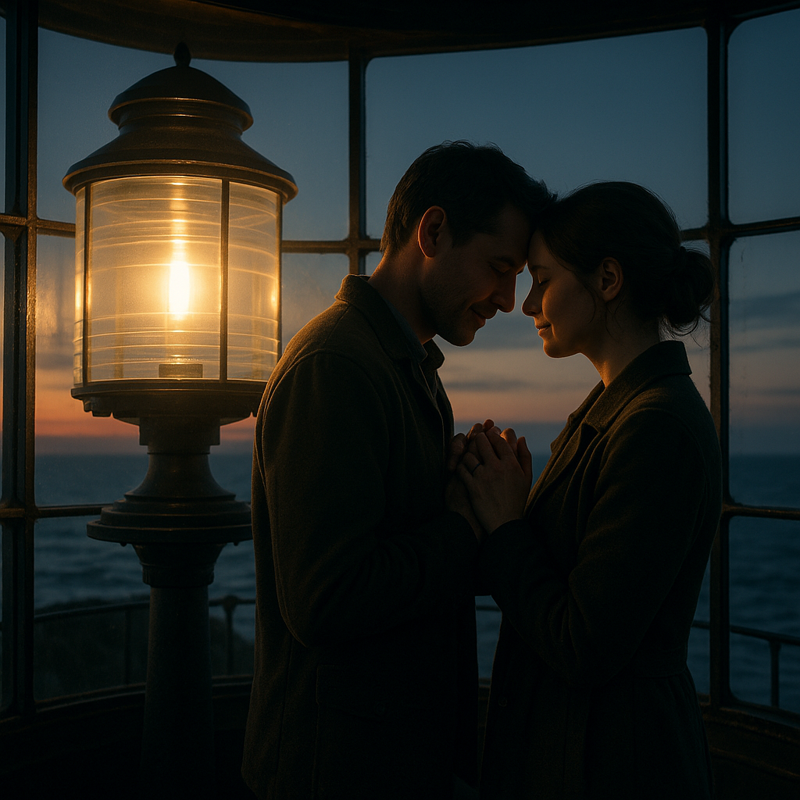
| Author Notes |
Cast of Characters
Claire Crandon ó A writer and historian returning to her hometown after her father's death. Determined to restore the lighthouse and uncover the truth behind the secrets her father left behind. David Reed ó Contractor overseeing the lighthouse restoration. Grandson of Douglas Reed, a man whose lost love and unanswered letter lie at the heart of the mystery. Steady, grounded, and quietly protective. Lucy Crandonó Claire's cousin, raised by Ruth. Outspoken and loyal, but shaken when she learns the truth about her birth and the secrets that bound her family for decades. Ruth Crandon ó Claire's aunt and Lucy's adoptive mother. Fiercely protective, burdened by the promise she made long ago to keep a secret that has cost her nearly everything. Andrew Crandon ó Claire's late father. The former lighthouse keeper who pieced together fragments of a long-buried truth and left a trail for his daughter to follow. Lily Wheaton ó A young woman from the past whose forbidden love with Douglas Reed and tragic fate shaped the lives of everyone on the point. Douglas Reed ó David's grandfather and Lily's lost love. A man of quiet honor who never knew the truth about the child he left behind. John Reed - David's father Gideon Pike ó The harbor master. Rugged, loyal to the sea, and always first to answer a distress call. Harper Benton ó Owner of the general store. A practical man with a good heart and a hand in every town effort. Dr. Avery ó The retired town physician who once delivered a baby at the lighthouse on a storm-tossed night forty years ago. Trudy Lansbury ó A persistent reporter from The Gazette, digging into local history and stirring up truths some would rather stay buried. |
![]()
By Begin Again

| Author Notes |
Author's Note
Thank you to each of you who stayed and shared the lives of each of my characters. With this chapter, we close the circle on Yesterday's Dreams ó The Forgotten Dress, By the Sea, An Untold Story, and The Lighthouse. I hope you'll join me for the next journey, After the Storm ó including Mending the Heart, Yesterday's Brushstrokes, High Water Mark, and The Reply. I can't wait to share what comes next. |
|
You've read it - now go back to FanStory.com to comment on each chapter and show your thanks to the author! |
![]()
| © Copyright 2015 Begin Again All rights reserved. Begin Again has granted FanStory.com, its affiliates and its syndicates non-exclusive rights to display this work. |
© 2015 FanStory.com, Inc. All Rights Reserved. Terms under which this service is provided to you. Privacy Statement